of Minister De Grave as if it were the truth. 222 But it’s nonsense.
On 27 November 2015, the emergency hearing takes place at
the Palace of Justice in The Hague. First, Judge M.E. Groeneveld-
Stubbe gives the floor to my lawyer, who begins his plea in a sub-
dued tone: the material as presented in The Cover-up General is by no
means unfounded, let alone — contrary to what has been claimed
— fabricated from start to finish. 223 ‘This is a well-documented and 156
The Cover-Up General
verifiable work that feeds the public debate,’ as evidenced by the
thorough documentation alone, as well as reviews and reactions
from veterans and politicians.
Thunnissen suddenly interjects. This is all made up! None of
it is true, he shouts in indignation. To back up his words, he intro-
duces an overweight serviceman sitting in the audience. The man
turns out to be off-duty Navy Captain Wouter van Straten, former
Head of mid’s Intelligence Department.
Van Straten acts as if he has been given the floor. Furious, he
shouts that he has not been sacked from the mid. And certainly not
‘summarily’, he throws in my direction. Thunnissen backs this up
by pointing out that the naval rank of captain is the equivalent to
colonel — so the gentleman once represented quite a lot.
However, his resignation is not mentioned anywhere. Appar-
ently the naval officer mistook himself for the marine colonel dis-
cussed on pages 31, 49 and 92.
After the disturbing interruption, Van Groenendaal contin-
ues calmly. But when he talks about the chilling effect of this tri-
al, he is interrupted again. Groeneveld seems unfamiliar with
the legal term ‘chilling effect’. It refers to the fact that suing for
damages leads to self-censorship, which we don’t want to see in
our society.
Van Groenendaal parries the alleged falsehoods in The Cover-up
General with extensive documentation. From the pleading:
[Monica] sticks to the bare assertion that a particular statement
made by Giltay would be ‘untrue’ or even ‘a lie’. Giltay argues
that the facts support all his statements. That [Monica] had a
second job as an mid officer at Casema is undeniable. That she
was open about it is also crystal clear. That there was talk of ap-
plying to the mid is also undisputed and is conclusively shown
in exhibit 14. It is also established that at some point [Monica]
became very negative towards Giltay and manipulated his per-
sonal environment (the man with whom Giltay had a relation-
ship) (see exhibits 16A–16B). …
Since [Monica’s] argument is that her allegations about the
Chapter Sixteen | Book Ban
157
secret service have been misrepresented, the burden of proof
is on her: …
[In a case from 2013] the journalist’s notes were found to be
decisive. In this context, Giltay can refer to his personal notes in
the form of a report from 1999. This document has never been
shown to anyone before and was used by Giltay to record his ex-
periences at the time (exhibit 17 — forwarded). The book follows
these recorded notes almost verbatim.
Van Groenendaal then gives a point-by-point reply to the claims:
All of [Monica’s] claims are disproportionate. Banning the en-
tire book and even forbidding talking about it on future occa-
sions is so absurd that it needs no further explanation as to why
this is going too far. …
The claims for rectification are unusual, and the interest in
privacy on which [Monica] bases her claims is not suitable for
the rectification. That can only be a matter of correcting con-
crete facts. It is even against [Monica’s] interests to obtaining
rectification in three national dailies.
The demanded text and method of rectification also violate
the law and the test of necessity, because they go too far and
are completely open-ended. It is a text that does not focus on
concrete facts or actions: the entire content of the book must be
described as ‘false’. A form of public penance or punishment. …
Finally, the damages claimed have not been substantiated in
any way.
The plea is followed, among other things, by a discussion about
the possibility of rectification. When Groeneveld asks what exact-
ly it is that needs to be corrected, Thunnissen refuses to answer.
Everything in the book is wrong, he says with a poker face. He also
claims that he can actually produce evidence — demonstratively
waving a folder around the courtroom.
His client claims that she had nothing to do with intelligence
work at the mid, without specifying what she actually did there.
158
The Cover-Up General
That doesn’t sound convincing. After all, her boss, Van Straten, was Head of the Intelligence Department of the mid (see also page
58). Moreover, on her LinkedIn profile — found by spelling her surname with a ‘y’ — she mentions the position she held in 1998:
‘Assistant Department Intell mid’.224 In this way, she presents her-
self to the outside world as a former intelligence officer.
Without hesitation, reality is being turned on its head. Moni-
ca, for example, complains about the distress the publication has
allegedly caused her, claiming that she is suffering psychological-
ly. In doing so, she explains what her main interest is: receiving
high damages.
After a good hour and a half, Groeneveld ends the session. She
is apparently busy. At the beginning she said that she had not got
around to reading the whole book. Nevertheless, she plans to deliv-
er her judgement on 11 December.
Afterwards, Van Groenendaal is very satisfied. According to
him, the opposing team did a shoddy job. The only thing that wor-
ries him is Groeneveld’s lack of knowledge of publication law.
He goes on to explain that Thunnissen might as well have
been waving a copy of Donald Duck. The man can claim whatever
he wants: at this stage it is too late to submit documents. And the
other drama, with the former intelligence chief, should have no
impact either, because no witnesses are heard during preliminary
proceedings. As an experienced lawyer, Thunnissen knows this
too.
On 11 December it is announced that Groeneveld is ill and that
the judgement will be postponed. Out of curiosity, I call the court a
few days later to find out that the decision has been delivered that
morning. But they have forgotten to fax it to my lawyer.
He calls me half an hour later. We have lost! We are speechless.
Van Groenendaal explains that the claims for rectification and com-
pensation have been rejected. There is neither talk of a call-back.
But I am forbidden to distribute the book or talk about it anymore.
Van Groenendaal immediately makes it clear: ‘This judgement
can well be challenged on appeal.’ 225 He e-mails a copy of the faxed
decision.226 It reads in part:
Chapter Sixteen | Book Ban
159



The injunction judge:
5.1 orders the defendant to refrain from any further dis-
tribution, publication, and/or reprinting of the book ‘The Cov-
er-up General’, to remove the book from the internet and to
keep it off the internet as far as it is in his power to do so, and
to refrain from any further promotion of the book in lectures,
book launches and other public utterances, on penalty of a fine
of € 1,000 for each day of non-compliance, up to a maximum of
€ 100,000.
The censorship ruling, issued by fax
The next morning, the four of us meet at Boekx. With the ban on
distribution and promotion, ‘an unworkable and unnecessarily
broad penalty has been imposed,’ says Van Groenendaal. The last
three words of the clause ‘to refrain from further promotion of the
book in lectures, book presentations and other public utterances’,
are particularly unclear. If it had said ‘in other public venues’, I
would have known where things stood. But it doesn’t.
The wording chosen is so vague that it is not clear how far the
gag order extends. After all, I am forbidden to speak out loud about
a book that is partly autobiographical. For example, am I no longer
allowed publicly to defend myself against the state’s claim in the
Ombudsman’s report that I am insane? If I were to talk about Uncle
Frans in the tram, would I have to give Monica a thousand euro?
Too crazy for words. So, according to my lawyer, the judgement is
Kafkaesque.
‘Legally, the judgement is flawed on all sides. It can never pass
the necessity test under Article 10(2) echr.’ 227 Van Groenendaal 160
The Cover-Up General
is referring to the European Convention on Human Rights. Under
this agreement, freedom of expression and freedom of the press
should not be curtailed — certainly not in the drastic way the court
is decreeing here.
There are several perplexing passages in the ruling. How about:
The claimant has argued, with reasons, that there are many in-
accuracies in the book and has given several examples of fac-
tual inaccuracies and of statements that she claims not to have
made. It has been sufficiently demonstrated that a number of
facts are incorrect. This concerns, for example, the misspelling
of the claimant’s surname in the book — about which the de-
fendant stated that he did not know how her name was spelled
— and the giving of an incorrect age for the claimant. It must
be conceded to the defendant that these inaccuracies are not
material and do not have a significant impact on the claimant’s
personal life, but they do raise questions about the level of accu-
racy exercised by the defendant in writing his book.
If Groeneveld had read The Cover-up General in its entirety, she
would have come to a different conclusion. Note 49 (on page 220)
contains a detailed discussion of the different spellings. Monica’s
exact age could not be verified because she obstructed the rebuttal.
Groeneveld also ignores the fact that it is the method of op-
eration of intelligence officers to assume false identities with
fabricated personalities and dates of birth. For example, take
counter-intelligence agent Major De Ruyter, who, during interroga-
tions, alternates between being called ‘De Ruyter’ and ‘De Ruijter’.
The handbook Informatie en Opsporing teaches spies: ‘An agent may,
in the performance of his duties, act under cover of an assumed
identity or capacity, for example by using a false name’.228
I also learn from the website of review committee ctivd that in
many cases the names of secret agents are deliberately misspelled.
Indeed, simply using a false spelling is obviously a lot more subtle
and thus also far less troublesome than adopting an all-new cover
identity. In any case, these small variations do help to create some
Chapter Sixteen | Book Ban
161
confusion, as evidenced by the judgement that blames yours truly
for the falsification of the spelling of Monica’s surname.
What if I were to use the same reasoning and similar words as
Groeneveld? Then I would argue, with reasons, that there are many
inaccuracies in the judgement. I can also prove that a number of
facts are incorrect. This concerns, for example, the misspelling of
the surname of the claimant’s lawyer. According to the register of
the Netherlands Bar, his name is R.F. Thunnissen. 229 It is therefore not ‘R.F. Thunissen’ with a single ‘n’, as the judge writes in her ruling. The mention of an incorrect number is also apparent on close
reading of the decision: section 5.2 refers to section 4.11, whereas it
should be 4.12.230 It must be conceded to the judge that these inac-
curacies are not material, but they do raise questions about the lev-
el of accuracy exercised by the judge in delivering her judgement.
Banning a book that is already out of print is a blow to press
freedom. All because of a misplaced letter in Monica’s name and
an incorrectly given age, which are not my fault.
It is rare to ban a book in the Netherlands, and even rarer to
muzzle a writer. But it is happening now. Without even a shred of
evidence from the other side, freedom of speech is being restricted.
It is not only Monica’s role as represented in the book that is
censored. The ruling bans all kinds of testimony, including the ep-
ilogue by Hans Laroes, the former editor-in-chief of the Dutch na-
tional television news broadcaster nos. His freedom of speech has
thus also been compromised — as if we are living in a totalitarian
state.
Nor am I allowed to reveal any new information about our for-
mer colleague Mark. Earlier this year, I read on his LinkedIn profile
that from May 1995 to September 2000 he worked as a ‘special in-
vestigation officer’. 231 So not only was he a telephone salesman in a department where espionage crimes were committed, but — as he
now discloses — he was also a government detective. This informa-
tion matters. However, I am no longer allowed to pay any attention
to it.
There are other implications of the book ban: it makes it rath-
er uncomfortable for the Mothers of Srebrenica to refer to The
162
The Cover-Up General
Cover-up General in their lawsuit against the Dutch State. This hinders the truth about Srebrenica and the photographic film.
In Boekx’s office we quickly agree: we will appeal. ‘If necessary,
we will go all the way to the European Court of Human Rights in
Strasbourg,’ says a combative Van Groenendaal.
Chapter Sixteen | Book Ban
163
CHAPTER SEVENTEEN |
CHAPTER 17
Media
Now that I am no longer allowed to promote the book, I am
blacking out my website and no longer publicly posting
about it on Facebook and Twitter. Nevertheless, Thunnis-
sen responds immediately. On 17 December 2015, he e-mails Van
Groenendaal that, ‘given the spirit of the ruling’, I should also re-
move old posts about The Cover-up General from my social media
profiles. To achieve this, he tries to force the issue by threatening
to impose penalty payments.232
Although only ‘further’ promotion is banned, Thunnissen ex-
plains the judgement as requiring that my Facebook and Twitter time
lines be wiped clean — as if The Cover-up General had never come out.
The pressure is on to erase this Srebrenica-related espionage
scandal from the World Wide Web and thus from history. Under
penalty of a thousand euro a day. This is reminiscent of George
Orwell’s 1984, as if I had been silenced by the Ministry of Truth in
order to falsify history.
When I discuss the judgement in confidence with friends, one
question always comes up: was the court influenced from above
and is the State behind it? Either way, the consensus is that the ero-
sion of press freedom is a danger to the democracy of our country.
A friend of mine, an editor, writes a message to the media: ‘infor-
mal letter — not for publication: court silences author’.
Silvan Schoonhoven is the first to report the news. His article
‘Ban on book about spies’ appears in several daily newspapers. 233
The public news broadcasters nos and PowNed also report on the
astonishing judgement,234, 235 with other media outlets following
suit.236 In this way, Monica enters the national spotlight, with all three variants of her name being covered.
164
The Cover-Up General


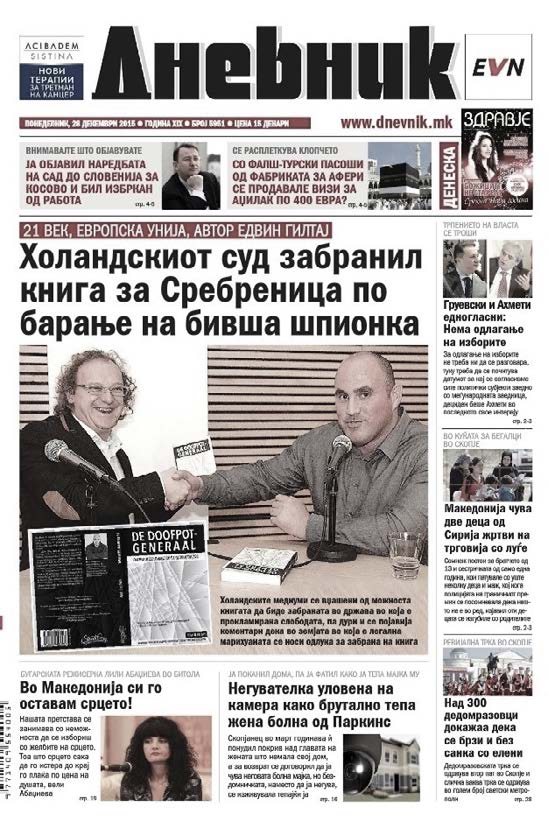
A few days later, the judgement makes the headlines in the
Balkans. An article appears in the Bosnian daily Dnevni avaz: ‘Au-
thor announces appeal: Dutch court bans book on Srebrenica!’ by
Alosman Husejnović. 237
Subsequently, daily newspapers, television stations and news
websites in former Yugoslavia — from Slovenia to Macedonia —
report on the Hague censorship. These include the respected Ser-
bian newspaper Politika.238 Translated from Albanian, Bosnian, Croatian, Macedonian, Montenegrin, Serbian and Slovenian, the
Balkan press is remarkably united: ‘Dutch judge’s ruling shocks
Bosnia and Herzegovina and especially srebrenica’,239 ‘Marijua-
na is allowed there, but not a book on Srebrenica’,240 and ‘Hague
court bans book on role of Dutch army in Srebrenica’. 241
Žana Božinovska of Macedonian
daily Dnevnik (Cyrillic: Дневник )
wants an interview.242 Despite the
gag order, I am going ahead with
this due to a sloppy formal error: the
judgement was not delivered to me
by a bailiff. To my lawyer’s surprise,
it was only faxed to him. And with-
out a formal delivery, it is definitely
not possible to impose penalties.
Dnevnik features the interview
prominently with a photo — of me
handing De Winter the first copy —
on its front page: ‘21st century, Eu-
ropean Union, author Edwin Giltay:
Dutch court bans book on Srebreni-
Frontpage Dnevnik
ca at request of ex-spy’.243 Some sub-
headings: ‘No one understands the
ruling’ and ‘Former spy appears in
court without evidence’.
Surprisingly, the gag order offers
opportunities for publicity. The fact
that my testimony of government
Chapter Seventeen | Media
165
abuses is being discredited by the judge is generating interest in
this dossier. And not just over the character assassination and
censorship, which I see as diversionary tactics. The truth about
this genocide related cover-up scandal is coming out — at home
and abroad.
This phenomenon is known as the Streisand effect, named after
the singer Barbra Streisand. She once sued to ban an aerial photo-
graph of her mansion. Her resistance to openness was the subject
of worldwide scorn, with the result that the photo ended up reach-
ing an audience of millions.
Conflict analyst Caspar ten Dam is a committed co-organiser
of the annual Srebrenica commemoration in The Hague. He sends
out a press release about the events, which is promptly picked
up by Dnevni avaz: ‘Following the ban of the book on Srebrenica,
we will fight for justice all the way to the European Court of Hu-
man Rights!’ 244
The publicity in the Balkans shows that I cannot be silenced
easily. This determination also emerges in an interview with Dutch
opinion magazine Nieuwe Revu.245 The State of the Netherlands has recognised it before: I am not easy to break.
166
The Cover-Up General
CHAPTER EIGHTEEN |
CHAPTER 18
Court of Appeal
On 8 January 2016, we file an appeal.246 In the Court of Ap-
peal in The Hague it is now Giltay versus Monica — the roles
have been reversed. My lawyer shows true thoroughgoing
diligence: the summons is 23 pages long. I am no longer bothered
by the silence of the publisher, Borgman.
Van Groenendaal’s appeal begins with a reference to the Eu-
ropean Convention on Human Rights and previous rulings by the
European Court of Human Rights (ecthr) in Strasbourg reviewing
the convention:
Giltay first argues that these orders [the distribution and speak-
ing ban] by the preliminary court are disproportionate and
manifestly contrary to the necessity test under Article 10(2)
echr and the jurisprudence developed by the ecthr. The inter-
im judge did not examine the proportionality and subsidiarity
of the measures imposed.
The latter implies that the District Court of The Hague did not con-
sider whether the measures imposed were appropriate. Could they
not have been less intrusive in order to achieve a solution? Van
Groenendaal: ‘For these reasons, Giltay considers the judgement to
be a serious miscarriage of justice.’
He then points out, among other things, that the other party did
not provide any evidence:
Giltay also argues that there is no factual basis for granting the
claims. The defendant [Monica] is suing on the basis of a very
short summons without exhibits … In Giltay’s view, Monica
Chapter Eighteen | Court Of Appeal
167
failed to comply with her duty to disclose evidence and, for that
reason alone, the claims should have been dismissed.
Nine complaints focus on what is wrong with the judgement. Van
Groenendaal also includes three articles that appeared in the Bal-
kans — along with English translations — because they show that
The Cover-up General is feeding public debate in Europe. 247 He also emphasises that:
Furthermore, the judge does not dwell for a second on [Monica’s]
bold assertion in the official mid report (exhibit 14) that Giltay
was allegedly dismissed for ‘inappropriate and irritating behav-
iour’. This was refuted by Giltay in his pleadings, specifically
points 33 et seq. and exhibits 13A–13C quoted therein. According
to Giltay, this shows how unfairly the court dealt with the facts of
the case. The court turned a blind eye towards evidence of [Mon-
ica’s] misrepresentation and distortion of the truth. The evidence
Giltay has to support his version of the facts was dismissed with-
out mercy. The same goes for [Monica’s] questionable behaviour
towards [Jasper], who twice stated in writing that [Monica] had
indicated to him that Giltay was a dangerous person.
Meanwhile, the interview with me has appeared in the Nieuwe Revu
with a large portrait photo and the title: ‘My book is actually being
read more now’. 248 Agitated, Thunnissen e-mails my lawyer about
all the publicity:249
Please advise your client that this is unacceptable and that my
client’s current position is that he has forfeited penalties which I
hereby demand to be specified for each day and each utterance
made by your client. The figure is large, but your client has al-
ready taken it upon himself to owe my client a considerable sum.
Some friends are worried: will this soon cost tens of thousands of
euro? But there is no need to worry, because the judgement was
never correctly handed down to me.
168
The Cover-Up General
Van Groenendaal replies that this does not constitute promot-
ing The Cover-up General. 250 I merely explained the judgement published by the District Court and did not violate it. My lawyer
then offers to help his colleague by sending him the documents
we had previously submitted to the court. Thunnissen had indeed
lost them.
On 2 February, a response memorandum arrives, Thunnis-
sen’s written response to our summons.251 At the District Court, he waved a ‘folder of evidence’: Is he coming out with it now or
was he bluffing? The latter. The papers contain only one exhibit,
nothing more.
Exhibit 1 contains a letter to Monica from Head of the mid Van-
deweijer dated 3 November 1998, that is, several months before De
Grave dismissed him. The letter was signed on behalf of Deputy
Minister Henk van Hoof, 252 who is best known today for allegedly
threatening Fred Spijkers with death in 2000 in order to deter him
from disclosing certain documents — but that aside. 253
Vandeweijer wrote to Monica: ‘Further to your request of 28 Oc-
tober 1998, I hereby inform you that you have been granted an hon-
ourable discharge with effect from 1 January 1998, in accordance
with Article 113(1) and (5) of the Burgerlijk Ambtenarenreglement De-
fensie (Civil Servants’ Regulations of the MoD).’
There is only one conclusion to be drawn from putting the dates
in the letter in chronological order: Monica was granted discharge
on 3 November 1998, with effect from 1 January earlier that year.
This is extremely strange. It raises the question of whether there
has been a typing error, or whether the MoD is deliberately trying
to evade responsibility for Monica’s failure as an intelligence of-
ficer at Casema in mid-1998 with the official dismissal date.
A confidant comments: ‘I think at mid they don’t want to get
their fingers burned on this case, so they don’t want openly to sup-
port [Monica], let alone with fabricated evidence, because that’s
sure to attract press interest and then heads will roll.’ 254
Without offering any evidence, the response memorandum is
little more than 15 pages of fluff. I e-mail Van Groenendaal: ‘As long
as you write a lot, no one will notice the lack of substance — that
Chapter Eighteen | Court Of Appeal
169
must have been the thought of your esteemed colleague.’ 255 It is funny, however, to come across a Freudian slip in such a colour-less text, when the author spontaneously switches from the term
‘chilling effect’ to ‘cheerleader effect’. Rather than focusing on the
chilling effect of the book ban, he prefers to think of a team of hot
cheerleaders. I can well imagine.
The memorandum states that Monica does not recall ‘ever
having spoken’ to Jasper. This contradicts what she said when in-
terrogated by the mid in 1999: ‘She was familiar with the fact that
[Jasper] used drugs because he openly admitted to taking the occa-
sional “pill” .’ 256
By the way, Jasper told me that he and Monica talked a lot about
homosexuality at Casema. She played an admirable role in help-
ing him to come to terms with his orientation. Less admirably, she
later cast suspicion on me and manipulated him into breaking off
our relationship. To this effect Jasper has made written statements,
which have been filed as exhibits.257 And what about paragraph 36?
Giltay goes on to complain about [Monica’s] claim that he would
have been sacked from Casema for inappropriate militant be-
haviour. She would have been wrong to make this argument as
it has since been refuted by Giltay in writing, with evidence.
The District Court did not address this, but this was no different
from the information [Monica] had, and therefore this fact and
Giltay’s rebuttal were not relevant to the judgement.
Monica is sloppily quoted here by her own lawyer. Her unfound-
ed accusation was not ‘inappropriately militant’ but ‘inappropriate
and irritating’. Monica also described me as ‘completely insane’,
which was also published as Minister De Grave’s response in the
Ombudsman’s report 1999/507.
In 2015, Minister Hennis refused to investigate the espionage
affair described in The Cover-up General. Her defence: ‘In this con-
text, I consider it significant that the National Ombudsman inves-
tigated your complaints against the then mid in 1999 and declared
them unfounded.’ 258 The Minister is thus relying on a report based
170
The Cover-Up General
on allegations that her predecessor, De Grave, took over from Mon-
ica, which the latter now says I have refuted with evidence.
This means that the appeal is producing early results: since De
Grave has evidently given false information to the Ombudsman,
Hennis can no longer hide behind the Ombudsman’s investiga-
tion. Several newspapers report on this.259 A confidant comments
by e-mail:260
I like the fact that you are not only standing up for what is pri-
marily at stake in this case, the ridiculous ban on publication
(and the even more outrageous obligation to keep silent. Surely,
if you did not already doubt the integrity of the previous judge,
this removes any doubt: totally out of place, neither in line with
current jurisprudence nor with the principles we are trying to
uphold in a state of law!)
But you also want to reopen this case. … Something our fel-
low readers ;-) won’t be too happy about, but at the same time
they won’t mind too much because it’s been a while and no
heads are going to roll at this point. This for the consideration
of third parties ;-)
… For the State to try personally to damage the whistle-
blower in a cover-up affair is unfortunately common — it is no
different with our ‘allies’ — but still unacceptable. I would defi-
nitely take it up, with the Ombudsman or the courts, and not let
them get away with it. The bottom line should just come out.
Since it is not inconceivable that my internet and phone traffic is
being intercepted, I find it amusing that any intelligence officers
reading this e-mail are being addressed here. However, it seems to
me that it makes more sense for them to monitor and apprehend
terrorists than innocent civilians.
If I were to follow the confidant’s advice, it would not be so
much out of self-interest. It is more a question of finding out more
about what is going on in the Srebrenica dossier.
On the advice of my lawyer, several copies of The Cover-up Gen-
eral are sent to the Court of Appeal so that the three judges can read
Chapter Eighteen | Court Of Appeal
171
it at the same time. However, Monica also has submitted a copy,
which piques my interest.261
Boekx arranges an appointment for me at the court. At the
Palace of Justice, an usher leads me through long, narrow corri-
dors to where Monica’s copy of the ‘forbidden book’ is kept. In the
process, I almost bump into Peter Blok, who will preside over the
appeal. 262
It turns out that Monica’s copy is full of under-linings and an-
notations. In the margins, there are cries such as ‘sheer nonsense’,
‘bah!’ and ‘nonsense and lies.’ Just what it was all about then, and
why she infiltrated a customer service department in her capacity
as Assistant Department Intell, she does not explain.
The hearing takes place at the Court of Appeal on 25 February. nos
News does a live interview with me there on Radio 1. 263 Before entering the courtroom, the final question is: ‘How do you see your
chances?’ I reply resolutely: ‘I’m going to win.’
A three-man camera crew from ThePostOnline is present to film
the entire session. They got special permission to do this. Only
Monica is not allowed in the picture because she does not want to
appear.
The camera is on. Judge Blok begins by saying that he and his
two fellow judges have read the book.
Van Groenendaal begins with his plea. 264 In total, we have now
submitted thirty exhibits: the evidence speaks for itself. It feels a
bit like we have a 30-to-1 advantage in this legal battle. On the Sre-
brenica photographic film, my lawyer says:
The statement about the photo roll can be found in Giltay’s
notes. As far as these notes are concerned, they can be consid-
ered as evidence. In any case, as a substantiated fulfilment of
Giltay’s burden of proof, in accordance with the rule in the case
of the taxi driver versus daily Het Parool.[265] It is also important that the notes of the time correspond exactly with the contents
of the book, rather than relying on memories of things from
ten, fifteen years ago. This adds a great deal of credibility.
172
The Cover-Up General
I also refer to exhibit 29. Giltay requested the Minister of
Defence to proceed with investigations. This also concerns the
photo roll.
Earlier, Thunnissen admitted, surprisingly, that Monica’s allega-
tions about my behaviour have since been refuted. Again we hear
something sensible from him. He distances himself from his plea
agreement, distributed by him, on the issue of his client’s security
risk. According to the Ministry of Defence, which was recently con-
tacted, this risk would be very low. 266
Despite this, Thunnissen claims that his client had to take some
security precautions and received help from the MoD.
What does the mother of the murdered Marianne Vaatstra
have to do with this case? Because a controversial book had been
published against the mother’s wishes, the judge awarded her
two hundred thousand euro to be paid by the authors. Thunnis-
sen claims this case is similar. In concrete terms, I could expect to
have to pay a very high amount of money because of the discussion
about damages.
So I have to work for Monica for the rest of my life? The picture
Thunnissen paints is tragicomic. It comes to mind that with this
comment he loses credibility with the judges.
Off-duty Navy Captain Van Straten, the disrupter, is back again,
though this time he fails to make silly accusations about matters
not mentioned in the book. From the public gallery, he claims that
Monica had nothing to do with intelligence work at mid. Oh well, it
doesn’t matter what the off-duty boss says. The judges understand
that he is not under oath and has not given a written statement. So
his words do not add to the evidence in favour of his former em-
ployee Monica.
‘I am being portrayed as a spy. I am no Mata Hari.’ There is a
hint of indignation in Monica’s words — they are on film. 267 She also lets slip: ‘There are no spies working in the mid.’
Whatever job title you want to use for an intelligence officer ap-
proaching potential candidates for her secret service, you can val-
idly style such a person a spy. As for the comment that there are no
Chapter Eighteen | Court Of Appeal
173
spies working in the mid, that seems to me to be pure nonsense. If
that is the case, shouldn’t our country just surrender?
As she says ‘no’ over and over again, Monica continues to shake
her head vehemently. When the judges ask her for the correct
spelling of her surname, she tells them the story of having it offi-
cially changed. But this does not explain why she spelled her family
name three different ways — as if it were the most natural thing
in the world for me to identify myself alternately in official docu-
ments as Giltaij, Giltai and Giltay.
Had Monica’s story been true, she could easily have proved it
by producing her deed poll. However, she fails to do that. Still she
is not backing down from her original accusation: I misspelled her
name in a book where everything is made up and lied about.
Following the hearing, ThePostOnline filmmaker René van Praag
interviews Thunnissen and others. If his client did not want to
be in the spotlight, why did she demand rectifications in nation-
al newspapers? Thunnissen gives a remarkably honest answer. On
camera, he distances himself from das, which was unwise enough
to include this demand in the summons. It was only later that he
became involved in the case.
He also states that he will not pursue any further legal action.
As far as he is concerned, the court now has the final say.
Van Straten is also interviewed by ThePostOnline. The former
Head of Intelligence at the mid — who had just blurted out in the
courtroom that Monica had nothing to do with intelligence work —
now suddenly says that she moved around the mid with dossiers,
some of them from spies, and turned them into intelligence for the
Armed Forces.268
When Van Praag confronts my lawyer with this, he replies: ‘Is
that so? Well, she has denied that strongly in the case.’ With an
astonished smile on his face, he adds to the camera: ‘That should
have been said a little bit earlier.’ 269
I am surprised that former secret service agents have come up
with so much nonsense in this case. A colleague of my lawyer’s,
who came along, informs me that this is thus a unique case: he had
174
The Cover-Up General
never attended a hearing where one party made so many claims
with so little evidence.
Van Groenendaal is hopeful: ‘There is almost no other way for
this book simply to reappear.’ 270
Chapter Eighteen | Court Of Appeal
175
CHAPTER NINETEEN |
CHAPTER 19
Appeal judgement
‘Hello Edwin, congratulations,’ Van Groenendaal writes
in a short e-mail on 12 April 2016.271 The judgement of
the Court of Appeal, signed by the three judges, is at-
tached.272 The weighing of interests, conclusion and decision are
as follows:
Weighing of interests
4.4. A balancing of Giltay’s freedom of expression against [Mon-
ica’s] right to respect for her private life leads to the conclu-
sion that the claimed injunction should be denied for the
following reasons:
4.5 On the one hand, upholding the claimed injunction would re-
sult in a serious restriction of freedom of expression. This is
because at least part of the book deals with issues that could
be the subject of a debate of social importance. In his book,
for example, Giltay states, among other things:
i) that the Ministry of Defence routinely rejects individu-
als applying to join the Marine Corps on the grounds of
homosexuality;
ii) that the roll of photographs taken by a Dutchbat soldier
in Srebrenica was not accidentally destroyed but delib-
erately withheld by the mid and is still in the archives of
the mid;
iii) that [Monica] was observed for speaking critically with-
in the mid about the withholding of the photo roll and
was subsequently dismissed from her job.
176
The Cover-Up General
Restricting Giltay’s freedom to raise these issues and express
his views on them would strike at the heart of fundamental
freedom of speech.
4.6 On the other hand, [Monica’s] interest in the injunction be-
ing granted is limited. Firstly, Giltay has argued, without be-
ing contradicted, that there can be no further distribution
of the first edition of the book because it has already been
fully distributed and all references to [Monica’s] name in
statements about the book on Giltay’s website have already
been removed. To that extent, therefore, the claimed injunc-
tion cannot have any effect. Secondly, Giltay undertook not
to use [Monica’s] name in any new print runs of the book,
including translations, or in any statements about the book
(Giltay’s exhibit 8, and again promised to the court during the
plea). It has not been argued or shown that there is a real
risk that Giltay will not honour this undertaking. [Monica]
has only argued that the undertaking is inadequate because
readers of a reprint will be able to find out her name from
copies of the first edition distributed and from publications
about the book. That possibility does exist, but it is unlikely
that a significant number of readers of the reprint or of any
new statements by Giltay about the book will choose to make
use of it. [Monica] has also failed to make clear why readers
of the reprint would look for ways to identify her with any of
the characters in the book.
4.7 Moreover, the book’s criticism of the aforementioned social
injustices is not directed at [Monica], but at the Dutch State
and a former general. Nor does [Monica] argue that the book
suggests that she can be blamed for them. The crux of her ob-
jections to the book is that it portrays her, in her own words,
as a ‘babbling’ spy or a ‘chatty person who comes clean about
her work at the mid’. It is a description that is negative, but
not one so damaging that it should be banned even in an-
onymised form.
Chapter Nineteen | Appeal Judgement
177
4.8 Furthermore, given the weighty importance of freedom of
expression, Giltay must be granted a wide degree of freedom
in choosing the form in which he exposes the social injus-
tices he has identified. Giltay was therefore free to choose
what he calls an ‘autobiographical form’, one in which the
discourse on these injustices is underpinned by his own ex-
periences. This form means that (the author’s perception of)
the behaviour and expressions of people who are not public
figures but who play a role in the story, such as [Monica], are
also described in detail. Therefore, the invocation of free-
dom of expression applies not only to the parts of the book
that deal with the role of the Dutch State and a former gen-
eral, but also to the parts that describe the behaviour and ut-
terances of non-public figures, especially when these people
are referred to by fictitious names, as Giltay has promised to
do with [Monica].
4.9 [Monica’s] objection that the book contains various inaccu-
racies about her cannot lead to a different judgement. The
only inaccuracies which the parties do not dispute relate
to her age (34 instead of 40) and the spelling of her name
… As such, these limited shortcomings are not serious
enough to establish an infringement of [Monica’s] rights
that would justify a ban on the publication of Giltay’s book.
Contrary to the preliminary ruling of the District Court, the
Court of Appeal finds that these inaccuracies are not suf-
ficient to call into question the accuracy with which Giltay
wrote the book. As regards the spelling of the name, this is
underlined by Giltay’s statement that he took this spelling from
a memorandum prepared by the mid as part of the Ombuds-
man’s investigation (Giltay’s exhibit 14) and by the fact that
[Monica] herself failed to spell her name correctly in a letter
she sent as part of the same investigation (Giltay’s exhibit 22).
4.10 As for the other parts of [Monica’s] description, the extent
to which they are accurate cannot be determined in the
178
The Cover-Up General

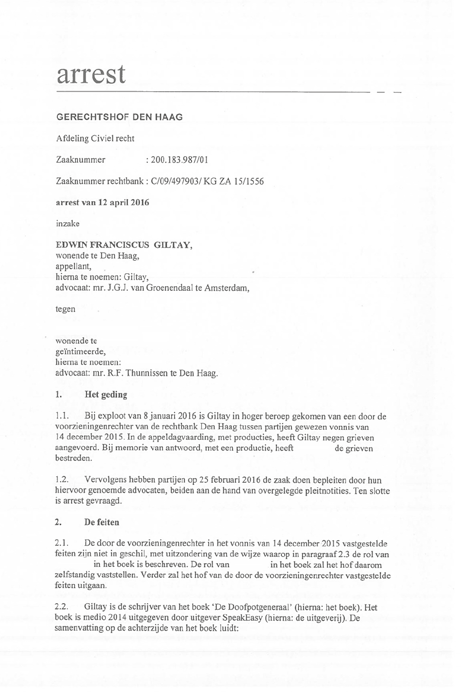
context of these preliminary proceedings, partly because the
description consists largely of a reproduction of verbal con-
versations between Giltay and [Monica]. However, it is estab-
lished that [Monica’s] role in the book is not, contrary to what
she claims, ‘purely fabricated’ or ‘entirely fictional’. It is thus
established between the parties:
i. that during the relevant period [Monica] and Giltay both
worked at Casema during the evening hours;
ii. that during this period [Monica] was also an employee of
the mid;
iii. that while working at Casema, [Monica] and Giltay dis-
cussed Giltay’s application to the Marine Corps and that
[Monica] advised Giltay to apply to the mid.
This is not to be taken to mean that the entire description of
[Monica] in the book is accurate, but it does indicate that the
description is at least partially supported by the facts.
4.11 Nor can a different decision be
reached because Giltay did not
ask [Monica] for a rebuttal before
publishing the book. It is not dis-
puted that the right to a rebuttal
is not absolute and that the distri-
bution of a book is not unlawful
simply because not all the people
featured in the book have been
asked for a rebuttal. While the
absence of a rebuttal is a relevant
circumstance, it does not weigh
The appeal judgement
heavily in [Monica’s] favour in this
case for the additional reason that
Giltay’s criticism of social injus-
tices in the book is not directed
against [Monica], but against the
State and a former general.
Chapter Nineteen | Appeal Judgement
179
4.12 Nor can [Monica’s] argument that she runs a security risk if
a (former) soldier with a Srebrenica past and post-traumatic
disorder might be offended by [Monica’s] careless talk in the
book about the photo roll. To the extent that (ex-)soldiers
with a Srebrenica past might be angered by this alleged in-
discretion, it is not plausible at this stage that it poses a real
security risk to [Monica], additionally in light of the fact that
no security incidents have been alleged or proven to have oc-
curred in connection with the publication of the first edition
of the book or its promotion. Nor has [Monica] provided any
concrete evidence of a threat or otherwise substantiated the
alleged security risk, while Giltay expressly denied the risk
by providing a message on the subject from the president of
the Dutchbat 3 association (Giltay’s exhibit 1).
Conclusion
4.13 In light of the foregoing, it must be concluded that the ob-
jections to the imposition of the (penalty) injunction are
well-founded. Accordingly, there is no need for a separate
discussion of the objections.
4.14 As [Monica] is the losing party, she is ordered to pay the ex-
penses of the proceedings at first instance and on appeal.
5.
The decision
The Court of Appeal:
5.1 nullifies the preliminary ruling made by the District Court of
The Hague on 14 December 2015 in so far as it granted the in-
junction and penalty payment and ordered Giltay to pay the
costs of the proceedings;
and therefore in reassessment:
180
The Cover-Up General
5.1.1
dismisses the claimed injunction;
5.1.2 orders [Monica] to pay the costs of the proceedings at
first instance, assessed by Giltay at € 78 in court regis-
try fees and € 816 in lawyers’ fees.
5.2 otherwise upholds the judgement;
5.3 orders [Monica] to pay the costs of the appeal, estimated to
date at € 314 for court registry fees, € 94.08 for bailiff’s fees
and € 2,682 (3 points × € 894) for Giltay’s lawyers’ fees;
5.4 declares the orders for costs of proceedings provisionally
enforceable.
This judgement was delivered by the Judges P.H. Blok, G. Dulek-
Schermers and H.J.M. Burg, at the public hearing on 12 April 2016,
in the presence of the Registrar.
Chapter Nineteen | Appeal Judgement
181
CHAPTER TWENTY |
CHAPTER 20
Press freedom
The Court of Appeal of The Hague publishes the judgement
on its website with an accompanying press release.273 Im-
mediately, nu.nl and Villamedia write about it.274, 275
That same day I visit Van Groenendaal at his new law firm, Van
Kaam, in Amsterdam. We are very relieved. He says it is extraordi-
nary that the Court of Appeal has distanced itself so much from the
decision of the District Court. We really won on every point.
The victory feels like liberation. The attack intended to mar-
ginalise me as a socially subversive citizen has been defeated. Ac-
cording to my lawyer, the judgement can be claimed as a victory
over the MoD, not just a victory over a former MoD employee. After
all, Monica was supported in her legal battle by a senior military
officer. Moreover, Thunnissen claimed in the courtroom that his
client had been helped by the MoD.
Van Groenendaal observes: ‘The banning of an entire book
never really happens. It’s still a mystery why the District Court
banned it. Apparently, The Cover-up General was regarded by
some as too explosive in nature.’ Dnevni avaz promptly writes
about it. 276
A confidant comments: the State apparently agreed with the
District Court of The Hague to ban your book. But the three judges
of the Court of Appeal were not intimidated; they overturned the
District Court’s decision in your favour.
Reactions are pouring in. mp Harry van Bommel e-mails: ‘Great
news!’ 277 Former Minister Jan Pronk writes: ‘Justice has been done’, 278 while Bert Bakker, ex-chairman of the Parliamentary Commission of Inquiry on Srebrenica, responds: ‘Fantastic! Congratulations Edwin!’ 279
182
The Cover-Up General
The victory for press freedom is, of course, also a victory for
journalism. Congratulations arrive by e-mail from Hans Laroes,
Philip Dröge, Brenno de Winter, Silvan Schoonhoven, Jan Born,
Joris Luyendijk, Kenneth van Zijl and Frénk van der Linden. All
this support is by no means trivial, because it protects me. I have
not forgotten the disruption measures of the past.
New publishers come forward, eager to publish a second edi-
tion. I choose Blue Tiger Media, a publisher with an eye for social
issues. 280 I sign up for a five-year contract, ending in 2021. 281
Publisher Tom Zwitser asks me to describe the legal battle to up-
date the second edition and also to anonymise Monica’s name in it.
However, my editor warns me: are you spelling her fictional name
correctly? Isn’t her name ‘Monique’ instead of ‘Monica’? All the fuss
about the book being banned because of a single misspelled letter
is now being vented in jokes.
Monica’s downfall culminates in an order to pay €4,115.08 in
legal costs. The failure of former MoD officials in this case is un-
deniable. But Monica’s role in the whole affair should not be seen
as so great. No, the loss of face falls mainly on retired General Van
Baal, who supported her criticism and has remained silent since
the judgement.
The State is also shrouded in silence. Marco Gerritsen notes that
— as far as he can remember — the State Attorney did not say a word
about his reference to The Cover-up General in his case for the Moth-
ers of Srebrenica.282
Minister Hennis is silent as well. After my victory, she still refus-
es to distance herself from accusations that were refuted in court
months ago. It is as if the Ministry is not responding out of inepti-
tude: back in 1998 they already declared that my character was too
strong to break. On this last point, it turns out that the Armed Forc-
es were right after all — at least a Commander-in-Chief has failed in
his attempt.
Looking back, I remember what it was all about for me: I want-
ed to serve my country and prove my manhood. Whatever the
consequences, I wanted to commit myself to the Armed Forces’
mission of defending our freedom and democracy. I now realise
Chapter Twenty | Press Freedom
183
that, as a citizen, I am fulfilling this task with a victory for freedom of the press and freedom of expression. With a bit of bravado, you
could even say it is a victory over the Netherlands Armed Forces:
the ultimate proof of my manhood.
Promoting the international rule of law is another important
task for the Ministry of Defence. For this too, I have committed my-
self. Conflict analyst Caspar ten Dam puts it this way:283
Edwin’s book deals, among other things, with the famous photo
roll showing war crimes in Srebrenica, that ‘accidentally failed
to develop’ in a Dutch military intelligence laboratory, and with
statements Giltay heard that the photo roll was not destroyed at
all, but is secretly kept somewhere. For this reason alone, his
book is of national and international importance. And the con-
sequences of his account urgently require further independent
investigation, and if necessary legal action against those behind
the cover-up.
Of course, self-preservation was also a motive for drawing atten-
tion to this cover-up. The backlash in my personal and professional
life has not always left me unaffected. The judgement is a begin-
ning of reparation in this respect.
The aivd, which had previously refused to comment on the
escort project of its predecessor, the bvd, passes on the verdict
internally by issuing a brief memorandum: ‘Previous judgement
reversed. … The book The Cover-up General may be sold after all.
This is also reported by various media.’ 284
That’s right. Over the years, hundreds of articles about the book
and its triumph for press freedom appear around the world — from
Brazil to Indonesia. 285 In addition, the book is being included in
the collections of, among others, the Banned Books Museum in Es-
tonia, 286 the Srebrenica Memorial Centre in Bosnia, 287 the Royal Military Academy in Breda and the Peace Palace in The Hague.288
With the publication and distribution of The Cover-up General,
the Dutch State is confronted again and again with the inconven-
ient reality that disruption measures can backfire. Even decades
184
The Cover-Up General
later, such measures continue to cause consternation and criti-
cism at home and abroad. I hope that this mirror held up to the
intelligence services will have a cleansing effect and give officials
food for thought. If, in future, even one official decides to spare an
innocent citizen instead of silencing him, that will be a win.
Chapter Twenty | Press Freedom
185

186
The Cover-Up General







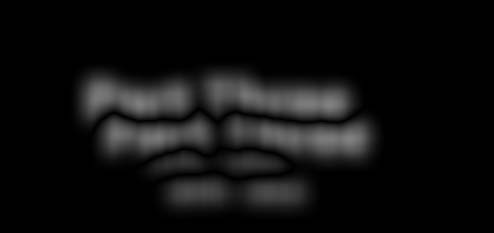
Part
P Thr
art
ee
Thr
2016
6– 2022
‘Fearful leaders side-step issues instead of dealing with them,
cover up mistakes instead of owning up to mistakes; they skulk back
into the shadows and hope that the crisis, whatever it is, will somehow
blow over instead of facing their fears. Worse, they resort to lies
and deception to cover up the truth.’
— Leon F. Ellis
Chapter Twenty | Press Freedom
187
CHAPTER TWENTY-ONE |
CHAPTER 21
Parliament
On 16 September 2016, Blue Tiger publishes the second edi-
tion of The Cover-up General. The new edition — with eight
additional chapters — is presented at the Amsterdam book-
store Scheltema and covered by a local tv station. 289, 290 Several
prominent legal experts are present, including Jurian van Groe-
nendaal, his confrère Simon van der Sluijs and Roger Vleugels,
who specialises in advocating for transparency in government.
During his short speech, the latter draws laughter when he says:
‘Holland is a kind of wholesale dealer of cover-ups. I recognize this
story fully.’ 291 The second speaker, Jehanne van Woerkom, who has
written books about Bosnian suffering in the war, 292 agrees: ‘It is about the “messed up” photo rolls from Srebrenica. So, as usual,
the mid is getting cramped because Edwin jotted down a couple of
things. So he’s targeted. ’293
Now that censorship has been curtailed, investigative journalist
Philip Dröge is publicly urging me to fight bravely to get to the bot-
tom of things. I also hear this wish from many others and it makes
me think.
I had previously indicated that I would no longer ask for reha-
bilitation. I find my life exciting and meaningful — the assessment
of a ministry that piles mistake upon mistake is irrelevant to me.
However, there are matters of greater importance in this dossier
that cry out for attention. It is important that our country admits
its mistakes regarding the photographic roll and the stonewalling
of unwanted witnesses. In a case with an international dimension,
the State of the Netherlands must restore the public trust that has
been violated.
In an interview about the government’s harassment, I am faced
188
The Cover-Up General
with the question: What do you hope to achieve with your book?
My reply:294
I would greatly appreciate it, should the Casema affair be inves-
tigated after all. Intelligence personnel have been responsible
for illegal infiltration, intimidation, intrusion and theft. And I’d
like to see the dubious role General Van Baal played be unrav-
elled. An appropriate task for Minister Hennis of Defence.
Even more important: this shady affair related to Srebrenica
must be uncovered: after all — we are talking about genocide.
The government intimidation that I personally encountered,
although scandalous, is insignificant by comparison. If the mil-
itary tries anything to put me off again, well, all efforts to shut
me up have proven unsuccessful. I’ll take them on any day.
A modest attitude on the part of the author or the publisher is not
appropriate here. Tom Zwitser tells the media that the publica-
tion is intended to stimulate public debate: ‘I have always had my
doubts about this affair: chances are that the photo roll is still in an
archive somewhere. Maybe people in the Ministry will come out
with new information.’ 295
There is no sign of this yet, although there seems to be a lot of
interest in this matter. When a former Dutchbat soldier, now a sen-
ior security advisor at the MoD, 296 shares the pdf of this book on a private forum in late 2016, about a hundred Dutchbat 3 veterans
download it within a day. 297
After being tipped off about the piracy, I send the veteran a mes-
sage on Messenger admonishing him to delete the e-book. Shortly
afterwards, there is an implied admission of guilt. He reports terse-
ly to me: ‘It’s gone.’ 298
There is no apology. Despite the Dutch copyright notice ex-
plicitly forbidding illegal distribution, the senior adviser writes: ‘I
thought it was allowed.’ Moreover, he argues, as if he was not to
blame, that The Cover-up General was much discussed after the book
was banned and was already being shared digitally. 299
The widespread distribution among (former) military personnel
Chapter Twenty-one | Parliament
189
may have been justifiable due to the significance of opposing mis-
guided censorship. However, that situation has changed with the
appeal judgement and the republication by Zwitser, who is now
disadvantaged. 300
Tips of wider significance also follow: Two former employees of
Post- en Archiefzaken (‘Post and Archives Department’) of the Royal
Netherlands Army complain to friends that the Srebrenica photo-
graphic film was deliberately destroyed in their department. The
testimony of one of the former employees: the former Head of the
Department, Jan van de Bosch, was ordered by the Inspector Gen-
eral of the Armed Forces (igk) to destroy the photo roll because it
would have embarrassed the Army. Despite his conscientiousness,
his boss put the evidence of war crimes in hydrochloric acid.
This version of history ties in with research into the unusable
roll. After the current affairs television programme Nova obtained
the roll, they had it examined by the broadcaster company Ne-
derlands Omroepproductie Bedrijf and photographic experts in
Munich. 301 Both the Dutch and the Germans concluded that Rut-
ten’s photo roll had been so thoroughly destroyed that it could only
have been deliberate. 302
However, Van de Bosch died years ago, and his former associ-
ates keep a low profile. None of them want to confirm their testi-
mony to me as a journalist.
Evidence — that’s what it’s all about. To my surprise, one day I
am given access to several sensitive documents relating to the af-
fair. As I have promised confidentiality to the supplier, partly for
her safety, I cannot use the documents in this case. Still, it feels
good to be faced with papers that support some of the statements
Lucas made at the time and shed more light on the indirect connec-
tion between this affair and the irt affair.
My pursuit of the truth is highlighted, among other things, in a
five-star review by Hebban. Under the headline ‘Secret services and
army brass on the rack’, the editors note: 303
Author Edwin Giltay describes in detail how our intelligence
services are flawed, covered up by the Ministry of Defence, the
190
The Cover-Up General
National Ombudsman and compromised ministers down the
line. They, like the reader, will have rolled their eyes in disbe-
lief. Not being provided with accurate information does not
absolve them of their duty to conduct a serious search for the
truth. It is unfair to say that they were ‘set up’.
Their truth-telling is off to a slow start. But it is worth noting that in
his memoirs, former Defence Minister Frank de Grave is scathing
about Dirk Barth, the Permanent Secretary who sent out the state-
ment on his behalf that I am ‘completely insane’. In Grote jongen
zijn (‘Being a big boy’), he discusses his dilemma at the time about
firing Barth. He also expresses doubts in retrospect about the wis-
dom of his decision not to do so. 304
I write to De Grave again. In view of his expertise as a mediator,
I am curious to know whether he sees a way out of this affair. 305 But he remains silent.
In the autumn of 2018, Remko de Bruijne asks me to accompany
him to an interview about the injuries he sustained in Srebreni-
ca. 306 The igk, Hans van Griensven, welcomes us in the Prince Bernhard Room of his North Holland estate.307 As his predecessor
Van Baal did nothing with my letters, I, encouraged by De Bruijne,
hand him a copy of The Cover-up General on the spot. 308
This dossier is an excellent opportunity for Van Griensven to
live up to his position as an independent advisor by conducting
further research. Critics, like Job ter Steege, roar: ‘Only now does
the reader get a perplexing impression of the drivel with which
high-ranking officials, with General Ad van Baal leading the way
… tried to cover up their failures.’ 309 Media like Al Jazeera question:
‘Why did they undertake such complex cover-up operations?’ 310
However, no reply is forthcoming. The igk does not answer.
A second book with Van Baal in the lead? A friend hands it
to me in the summer of 2020 in the bookshop where he works.
Colonel Brantz wrote Srebrenica: De Schuldigen (‘Srebrenica: The
Guilty’), 311 a memoir that reads like a J’accuse. Twenty-five confrontations with his former superior — allegedly out for ‘his blood’ —
are revealed.312
Chapter Twenty-one | Parliament
191



One of these concerns Rutten’s photograph-
ic film. Commenting on the official story of the
development failure, Brantz told Nova in Au-
gust 1995: ‘A self-respecting organisation like
the Royal Netherlands Army cannot afford to
treat this material in such a casual manner.’
Van Baal, the Deputy Commander-in-Chief at
the time, reacted furiously to — mind you — the
criticism. 313
Brantz’ black book
In his black book, Brantz dares to give
painful answers to the question of guilt over
Srebrenica. For that reason alone, it deserves
more attention. In addition, it is moving to
read how he experienced being wire-tapped,
observed, falsely suspected, thwarted in his ca-
reer, as well as silenced.314
Would the National Ombudsman, Reinier van Zutphen, like to
come clean on this dossier? Early 2017, I bring him the second edi-
tion and the appeal judgement and ask him in writing to withdraw
his 1999 report. 315 He refuses. Although the Court of Appeal of The Hague made mincemeat of Monica’s accusations, ruling that there
was no reason to doubt the accuracy with which this book was writ-
ten, he decided to uphold in full the public report containing her
denunciation of me. 316
The new facts in the letter will not lead to a different judgement:
with this statement, Van Zutphen justifies his refusal.317 Excuse me, did he even read the judgement? Is it not in his interest that
his organisation stops spreading misinformation? Be honest: ‘This
affair is about trust in a fair, reliable and credible government. And
more broadly, it is about the truth about Srebrenica.’ 318
I write the above in a follow-up letter in which I list nine griev-
ances and ask for a substantive response to each. I also kindly ask
him ‘to rectify the error appropriately, to withdraw the controver-
sial report and to communicate this to the outside world, stating
the reasons. Now that it turns out that your institute has been
192
The Cover-Up General
fooled by the Minister of Defence with false information for years,
I also request that you summon the minister once more to provide
full and proper clarification on this cover-up.’ 319
The words seem to fall on deaf ears. The National Ombudsman
has no appetite for responding to each grievance and persists in
denying the facts: ‘Any further letters on the same subject will
be received for information purposes only.’ Signed: Reinier van
Zutphen.320
His website boasts that, building on his ‘internationally rec-
ognised role’, he holds a position on the European Board of the
International Ombudsman Institute.321 This professional associ-
ation, based in Vienna, requires all member ombudsmen around
the world to abide by its statutes. According to these, every citizen
should be protected against any injustice caused by a public au-
thority.322 In plain language: if a Minister of Defence spreads false accusations to discredit a witness to military crimes, the principal
duty is thus to protect that person.
Why does Van Zutphen not do this? Why, with his report, does
he provide the Minister with a platform for a disruption measure?
And why does he continue to spread the disinformation when the
deceit has been proven beyond doubt and the Court of Appeal has
vindicated the aggrieved citizen on all counts?
In response to my calls, Van Zutphen could have withdrawn
his predecessor’s report without any pr damage. In doing so, he
would have shown that he takes his duties seriously and is willing
to correct mistakes. As the controller of power, he could even have
cultivated goodwill for his office by rebuking the MoD. But by dis-
regarding the appeal judgement, he is manoeuvring himself into a
precarious position. By leaving the document on his website, 323 the supervisor presents himself as the State’s puppet.
In a five-star review, the military website Boekje Pienter says
that ‘the book is about cover-ups that had to be kept secret at all
costs’. 324 By persisting in propagating falsehoods, the National Ombudsman is keeping the lid on them. This is bewildering. Others
question whether this behaviour can be explained by a lack of in-
sight, stubbornness or low ambition, or whether there is more to it.
Chapter Twenty-one | Parliament
193
Ben Paulides, journalist of the No Cover-up Foundation, asks
him a series of questions to clarify the situation. 325 All are equally legitimate. However, Van Zutphen brushes them aside: ‘I am not
going to answer your questions and I see no reason to engage with
you on this matter.’ 326 This is not the first time he has refused to speak to the media. The same thing happened to the daily nrc Handelsblad. It described his refusal as ‘arrogant’ and ‘blandly formal’.327
And what about Defence Minister Hennis? Does she at last express
regret, take legal action against those responsible for this cover-up,
and provide clarification to the families of the murdered Bosniaks?
Absolutely not. On 6 June 2017, the Head of Administrative,
Criminal and Disciplinary Law, J.J. Buirma, writes on behalf of the
Minister that the case is already closed. He is not only referring
here to the investigation of the National Ombudsman. My com-
plaint against the mivd would also have been declared unfounded
by the oversight committee ctivd. 328
However, Hennis wrote to me in 2015 that she refused to have
the mivd complaint investigated by the ctivd.329 For clarification,
I turn to Prime Minister Mark Rutte. 330 After his forwarding, mivd
Director General Onno Eichelsheim replies: ‘The ctivd has not
processed any complaint on your behalf against the mivd. For this
reason, there is no report from the ctivd.’ 331 Clear enough. So not only is Hennis hiding behind an ombudsman investigation based
on false information from the MoD, she is also hiding behind a
ctivd investigation that officially does not exist.
After I lodge an objection with the Minister,332 the reference to the ghost report quietly disappears. However, no fault is admitted. Hennis continues to ignore the facts, refuses to respond
to my arguments, and concludes her letter by saying that unfortu-
nately the Ministry cannot be of any further assistance to me on
this matter. 333
It is time for Parliament to demand clarity. I write to the mps that
I have been sidelined with ‘disruption measures’, enclosing copies
of The Cover-up General and urging them to raise the affair.334, 335
The response to this is overwhelmingly positive. At the behest of
194
The Cover-Up General
the Speaker of the House of Representatives, Khadija Arib, my let-
ter is placed on the agenda of the Defence Committee of the House
of Representatives.336 Subject: ‘Request for Clarification on Srebrenica Cover-up’.337 Date: 14 September 2017.
Meanwhile, on 27 June, I visit the Court of Appeal in The Hague to
hear the verdict in the appeal case brought by the Mothers of Sre-
brenica against the Dutch State. In the Palace of Justice, I recognise
the presiding judge. Gepke Dulek-Schermers, one of the judges in
my appeal case, has read The Cover-up General — so she learnt about
the photos of executed Bosniaks taken two days after the fall. She
now announces as part of her conclusion: ‘Dutchbat knew on 13
July 1995 that the [Bosniak] men ... ran a real risk of exposure to
inhumane treatment or being executed’.338
In front of some thirty widows and the world press, Dulek then
writes history by ruling that the Dutch State is partly responsible
for the deaths of 300 Bosniaks deported from Srebrenica. Bam! I
see this as a victory of the lawyers Gerritsen and Van der Sluijs for
the Mothers. The Court of Appeal has now set the record straight:
the Netherlands is partly responsible for the genocide. And equally
important, countries can no longer hide behind the un flag.339
A week later, I fly to Bosnia on a trip sponsored by the Dutch
Foundation for the History of Totalitarian Regimes and their Vic-
tims.340 Accompanied by Dutch-Bosnian journalist Naida Ribić and
Bosnian war film producer Omer Edo Hadrović, we travel to Sre-
brenica for the annual commemoration.341 ‘I would like to pay my
deepest respects to the victims,’ Dnevni avaz quotes me as saying
about my purpose. 342
At the memorial one woman wears a T-shirt that depicts her de-
ceased husband. She tells Naida in Bosnian that both her husband
and son were murdered. She doesn’t have a single photo of her be-
loved son. The woman bursts into tears and Naida comforts her
with a hug. This sad story is just one of so many we hear. More than
20,000 mourners are gathered here today.343
Following, we are invited to the office of the Mothers of Sre-
brenica. The next morning, we also receive a visit in our hotel by
Chapter Twenty-one | Parliament
195

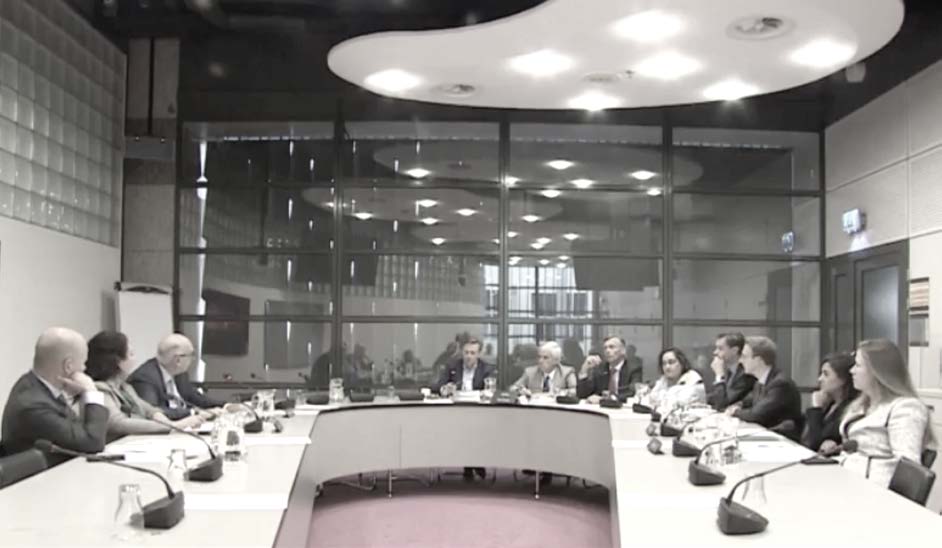
Ćamil Duraković, the former mayor of Srebrenica and organiser
of the commemoration. He tells me he wants to read my book in
English.344
When I walk into Parliament in The Hague two months later, I
am accompanied by several journalists, including reporter Esther
Monsma from the tv news programme Hart van Nederland ( HvN)
and her cameraman. They interview mp Sadet Karabulut and me.
Furthermore, they film the committee meeting, which is unique.345
During deliberations, the House of Representatives decides
unanimously that Hennis should answer the letter. 346 Great!
The committee’s meeting (©sbs6)
Karabulut states that the Minister of Defence is obliged to give this
man a real answer.347 A quarter of a million viewers watch the news
item.348 In Bosnia, Dnevni avaz headlines about the parliamentary decision: ‘The Netherlands owes it to the victims of Srebrenica’.349
However, no clarification is offered to the media. As part of the
adversarial process, the Ministry is claiming on Hart van Nederland
that my allegations are false. In an article accompanying the tv
programme, it uses a particularly contrived justification for this:350
‘Mr Giltay was declared mentally unfit at a time when he want-
ed to become an aspiring officer in the Royal Navy,’ the MoD
argues in response to declaring Edwin insane. ‘The National
196
The Cover-Up General
Ombudsman investigated Mr Giltay’s rejection by the Marine
Corps in 1999. The MoD was fully vindicated in this regard. So
there is no question of false psychiatrisation as a witness.’
Not only does the MoD insist on being in the right here, flaunting an
investigation based on lies. In its response, the MoD is also trying
to link the psychological assessment to the declaration of insan-
ity, where there is none. In effect, the Armed Forces are publicly
portraying this author as untrustworthy — even though the Court
of Appeal had ruled in my favour, as Hart van Nederland reports
on television.
Apart from yours truly, however, the Ministry implicitly dis-
misses other editors as incompetent as well. I write to Esther
Monsma: ‘It is like being an mp and asking: “Did the Minister drive
her official car privately?” — and getting the answer: “The Deputy
Minister did not declare receipts.” The MoD’s comments now give
the impression that you have made an article about a non-issue.’ 351
Monsma agrees and concurs that the MoD is evading the real
issue. 352 Next, her web editors add the following to the article:353
According to Edwin, an investigation was indeed carried out,
‘albeit carelessly’. But it did not involve the false psychiatrisa-
tion: ‘Whatever was examined when I wanted to become an of-
ficer has nothing to do with the later declaration of insanity,’
says Edwin. But the Ministry is trying to put a nice spin on it.
The Minister of Defence also fails to explain the affair to Parlia-
ment. Hennis misses the deadline to answer the House of Rep-
resentatives and resigns after continued heavy criticism of her
performance. After a fatal mortar accident in Mali, she had, as she
puts it, ‘reacted in a strange way’.354
Earlier, the Minister found herself in the cross-hairs of anoth-
er false psychiatrisation. F-16 pilot Victor van Wulfen had raised
safety concerns to the dissatisfaction of his superiors, after which
he was reportedly told during a medical consultation that he is ‘liv-
ing in a make-believe world’.355 But on that particular day he was
Chapter Twenty-one | Parliament
197
in South Africa. He also showed me the stamps in his passport to
prove it.356
Interim Defence Minister Klaas Dijkhoff sends the delayed
parliamentary letter to Speaker of the House of Representatives
Arib on 13 October. The letter makes no mention of the intrigues
at Casema, in violation of the constitutional obligation to provide
adequate information to Parliament. General Van Baal and his wife
are not even mentioned.357
In order for our rule of law to function properly, there are im-
portant questions that need to be answered, such as: was it legiti-
mate to take disruption measures? Has there been covert pressure
on the Judiciary to censor this book? Did Intelligence set up honey
traps without informing Parliament? However, these answers are
not forthcoming. 358
Only the Srebrenica photo roll is mentioned. The Minister spins
a tale of a ‘particularly embarrassing and unfortunate’ develop-
mental error, without responding to investigations that conclude it
was deliberately destroyed. 359
Dijkhoff goes on to praise the book’s ‘easy-to-read style’, but
nevertheless reports problems with reading it when it comes to
the declaration of insanity:360 ‘What the author means by this is
not clear. In any case, he never worked for the MoD. The Ministry
therefore has no medical records.’
The statement claiming I was ‘completely insane’ is recorded in
an official mid report, approved — indeed — by his predecessor De
Grave. 361 This is a disruption measure of the MoD’s own making,
and yet Dijkhoff says he does not understand it. Is it incompetence?
Or is he misleading the House of Representatives, which is a cardi-
nal political sin?
‘Dutch Defence Ministry keeps bumbling’ is the headline of
an article in the geopolitical magazine Novini on the continuing
shortcomings. The lead reads: ‘Not many ministries in the Neth-
erlands can boast as many blunders as the Ministry of Defence.
The department is under a, seemingly, never-ending siege. Even
setting things right seems constantly to fail.’ Dijkhoff’s successor
Ank Bijleveld appears in the article:362
198
The Cover-Up General
When asked, Minister Bijleveld declares: ‘In the book fact and
fiction are indeed intertwined.’ Nevertheless: The Court of Ap-
peal in The Hague overturned the book ban, resolutely. It ruled
its accuracy is not in doubt. ‘I do not have any views on that,’
says Bijleveld.
In the past, Mr Giltay has been branded as ‘completely loopy’
in an official report made public by the MoD. The incumbent
Minister denies endorsing the report: ‘The MoD has never spo-
ken about Mr Giltay in this fashion.’ The document, however,
has never been revoked and is still publicly available.
Bijleveld’s statements, which she does not substantiate, show once
again that her Ministry is distorting the facts in this dossier. After
two decades of untruths and excuses, this seems to be the policy
they are persisting with. Novini concludes the article as follows: 363
Having been discredited by the Ministry is one thing — Giltay
thinks there are bigger fish to fry: The covering up of the truth
about Srebrenica. ‘The Ministry never quite developed a ca-
pacity for admitting mistakes. Unlike certain rolls of film.’ De
Bruijne adds: ‘They prefer to keep everything under wraps, lest
damages claims would ensue. Neither justice nor truth is rele-
vant to them.’
Funnily enough, shortly afterwards Bijleveld does publicly correct
something for me, namely a triviality. Thereby, she praises my
thoughtfulness in front of a foreign Minister of Defence.
What occurs? In a Twitter message to her Belgian counterpart
Steven Vandeput, she misinterprets the abbreviation qra, which
stands for very high military readiness. I tweet her: ‘Dear Minister,
you are mistaken. The Benelux cooperation is not called ‘Quick Re-
sponse Alert’ but ‘Quick Reaction Alert’. 364 Like lightning, Bijleveld corrects herself: ‘Absolutely right. Too quick Response [sic] from
me. Updated in the meantime. Thank you for your alert reaction.’ 365
‘Thank you for your honesty,’ I tweet back happily. And while
I have your attention, could you also immediately confirm that I
Chapter Twenty-one | Parliament
199
am absolutely right about a certain intelligence scandal? 366 But this time the Minister does not have a ready answer. Despite thousands of Twitter views in the Low Countries, there is no reaction or
response from the Ministry which so appreciates alertness.367
Bijleveld’s praise fails to arouse much excitement for this book
in Brussels. Moscow, on the other hand, does show interest. Al-
exander Malkevich, as chairman of the media committee of the
Civic Chamber of the Russian Federation, is an adviser to President
Vladimir Putin.368 We meet in March 2020 at two symposia in Hol-
land on the downing of flight mh17. 369 The fact that The Cover-up General is still only available in Dutch does not deter the Kremlin
adviser from purchasing it right away.
As the antics of the Dutch state become more widely known, The
Hague continues to refuse to provide clarification. By letter, I in-
form Minister Bijleveld I have received various messages that the
infamous Srebrenica photo roll has been destroyed in the Post and
Archives Department of the Army.370 On the basis of the Freedom
of Information Act, I respectfully request she release all documents
relating to this matter. A few weeks later, the minister replies to me
that no documents have been found. 371
Like her predecessor De Grave, Bijleveld seems to be misled by
the Royal Army regarding the photos. Fact is that I have confidential
e-mails on the matter, namely the testimony of a former employee
of the department in question.
Hopefully, I am getting signals that the organisation wants to
become more open. For example, a former senior spokesman for
the Ministry of Defence visits me at home in late 2020. Although
invited because of the artistic legacy of my now deceased uncle,372
he begins to talk about this book and the photo roll. A journalist
friend of mine is also present.
The former press secretary praises my work and calls the
handling of the photo roll a ‘mockery’. In his opinion, it would have
been better if the photos had been published immediately — with
the announcement that they could not be stopped. ‘Many people in
the Ministry of Defence want the truth to come out.’ 373
200
The Cover-Up General
CHAPTER TWENTY-TWO |
CHAPTER 22
Rebuttal
Her claim that this book is a mixture of fact and fiction, was
not underpinned by Minister Bijleveld.374 Like her prede-
cessor, Minister Hennis, she had never called for an inves-
tigation by oversight committee ctivd.
I write Bijleveld on 29 June 2020 in the context of rebuttal. ‘To
date, I have received no substantive response from your ministry
regarding my internationally debated — and previously banned —
non-fiction thriller.’ If she still wishes to comment, I promise to
include it in a new edition. 375 Her reply: ‘The Ministry of Defence sees no reason to comment on the contents of the book.’ 376
A few months later, the National Coordinator for Security and
Counter-Terrorism (nctv), Pieter-Jaap Aalbersberg, issues the 53rd
edition of his report Dreigingsbeeld Terrorisme Nederland (‘Terrorism
Threat Assessment Netherlands’). In this listing of terror threats,
he warns that Blue Tiger acts as a ‘conduit for anti-government
propaganda, fake news and conspiracy theories.’ 377
Aalbersberg neglects to substantiate his intimidating accusa-
tions against the publisher. Yet they are quoted nationwide in the
press. 378 The Blue Tiger ends up in a legal battle with nctv over
this,379 with my support among others.380 Parliamentary questions also follow about Aalbersberg’s possible violation of the constitutional freedom of the printing press. 381
And rightly so: the government’s report is bizarre for a Western
democracy. It is more appropriate for a fundamentalist country
like Somaliland, where in 2018 an online newspaper published an
article entitled ‘How To Deal With Banned Books‘, listing seven-
teen titles that should be ‘burned’ and ‘completely destroyed’. At
Chapter Twenty-two | Rebuttal
201
the top of this Islamic index librorum prohibitorum is The Satanic Verses by Salman Rushdie, with the Bible at number 12. For some
mysterious reason, The Cover-up General also appears on the list, at
number 16.382
As far as I know, not a single copy of my book in Dutch has been
sold in the Horn of Africa, nevertheless, according to the article,
the Ministry of Information, Justice and Religion in Hargeisa is re-
sponsible in Somaliland for burning the books listed, deleting all
digital copies and banning reprints. The reason for throwing them
on the pyre: ‘harmful content’, which, incidentally, was not speci-
fied in any detail whatsoever. 383
I write to Aalbersberg about his alarming report on Blue Tiger:
‘Good heavens, my book The Cover-up General has been published
there! I never knew that my publisher, or I, pose a danger to the
state.’ From his point of view, does my book also fall into the cate-
gory of anti-government propaganda, fake news or conspiracy the-
ories? ‘If so, please explain in more detail — including passages and
page numbers.’ 384
No substantive explanation is forthcoming. After a written re-
minder,385 however, I do receive a polite letter. The nctv Director
of Crisis Management answers me on behalf of Ferdinand Grap-
perhaus, the Minister of Justice and Security, under whose au-
thority the nctv falls.386 While the accusations against Blue Tiger
were first presented without any nuance, they are now being toned
down considerably:
The ‘classifications’ would only be based on broadcasts, social
media posts and other (also unspecified) material which Blue Ti-
ger and its employees are responsible for putting out. They are ‘in
no way whatsoever based on the content of individual books pub-
lished by the publisher, such as the one you refer to’, says nctv
Crisis Management. 387
In that case, all well and good: with this answer it is clear that
The Cover-up General is beyond any of the suspicions reported, as is
the case with all publications of Blue Tiger, whose core mission is
to publish books that stimulate public debates. 388 I feel reassured that I have not been labelled as someone who spreads fake news by
202
The Cover-Up General
Justice and Security. It is also a relief to read: ‘The term “danger to the state” you suggested is not applicable’ here. 389
However, the fact that the published allegations against Blue
Tiger do not relate to its authors, is not made public by the nctv.
Nor does it retract or amend its online report. 390 With the Terrorism Threat Assessment Netherlands 53, nctv thus continues to raise
serious doubts among the population about the credibility and reli-
ability of the publisher’s publications. Knowing full well that there
is no basis for this, Aalbersberg’s national counter-terrorism report
deliberately spreads misleading information that chills freedom
of expression.
That a socially critical publisher can be perceived as a threat
by a government that is piling error upon error, is not difficult to
grasp. But what is happening here is unacceptable:
If the state is bothered by issues surrounding a publishing
house that have nothing at all to do with the books it publishes, it
should not attack it in a way that discredits that very core mission.
That is deceptive. It also falsely tarnishes the reputation of authors
who have done nothing wrong. In short, there are many reasons
why nctv has no business, under the guise of fighting terrorism,
acting as a conduit for government propaganda that, because of its
lack of any nuance, qualifies as fake news.
No less remarkable is the fact that the nctv letter reveals a curious
contradiction: Minister of Justice and Security Grapperhaus does
not classify The Cover-up General as fake news when I ask him about
it,391 while his counterpart, Minister of Defence Bijleveld, has previously denounced the book in the press as fake news. 392
Who is right here: the Minister of Justice and Security, and
therefore yours truly? Or the Minister of Defence, who has been
refusing to provide clarification for decades?
And then there is also the Home Secretary, who called off an
ctivd inquiry into the affair after six weeks, and stated he would
not comment on the book.393, 394
The contradictions within the government are striking. Min-
isters are constitutionally obliged to speak with one voice so that
Chapter Twenty-two | Rebuttal
203
government policy is consistent. The failure to do so confirms the
perception that our government is at a loss as to how to deal with
this affair.
This embarrassing blunder underlines how detrimental — not
to mention grossly anti-democratic — it is for a government to judge
what is fake news and what is not. The executive in my country
would have done better to listen to the judiciary, which has inde-
pendently ruled on The Cover-up General on the basis of evidence. 395
204
The Cover-Up General
Epilogue
Some time ago, I heard of a high-ranking officer preferring
not to mention ‘blue berets’ anymore. I suppose he is not the
only one in his line of work to be reluctant. This symbol of
many a peacekeeping mission has too much of a ‘Srebrenica’ con-
nection, the most painful chapter in recent European history. An
open wound in Dutch society.
Dutchbat was not equipped with sufficient weaponry, looking
on as thousands of Muslim men were separated and taken away
— abandoned by un Command. Their commanding officer was
forced to have a drink with a victorious Ratko Mladić. He observed
that he ought not be shot at: he was only the piano player. He had
no part in all this, he was just the hired help. He was dressed in a
uniform by accident, we should not expect any defiance from him.
This was more or less concurrent with the view we held at nos
Journaal, the public news service where I was employed back then.
At the time, a group of journalists stranded on their way to Srebren-
ica were put up near enemy troops — at the behest of local military
command. Their security detail: an officer who had only one gun
and only 26 bullets.
We did not quite realise something was terribly wrong, in July
1995. From my perspective, at the nos news desk, the first sign was
the Serbs having overrun the enclave. Initially, it was difficult to
obtain reliable information. From then on the question was wheth-
er Dutchbat would be able to return safely, or were they to be
kept hostage?
This was the conundrum we focused on. We went live from
where Dutchbat eventually arrived safely. The Prime Minister was
there, as was the Crown Prince. Only then a different reality came
into focus, which had been blurred before. If my memory serves
Epilogue
205
me well, it was Minister for Foreign Aid Jan Pronk who first spoke
of genocide.
It was what it was: the mass murder of over 7,000 men and boys;
on Dutchbat’s watch, to a certain extent. Were our troops witness
to it? Could they have prevented it? Should Lieutenant Colonel Kar-
remans have drawn the line, even in the face of a superior enemy
force — because his honour, his duty, his ethics demanded it?
Srebrenica was investigated. To take political responsibility in
some measure, the second Kok cabinet resigned; despite having
been relegated to a demissionary status already. Jan Pronk had
resigned even before, in order to take a stand. Dealing with dark
pages of its history is not one of Holland’s strong suits. We are still
struggling to confront Srebrenica.
And then there are the infamous pictures, taken in Srebreni-
ca by several soldiers. The roll of film was confiscated, diligently.
Handled diligently, naturally. Only to be inadequately developed,
diligently — destroyed or covered-up, nothing to see here … The
pictures would slightly overexpose the fact that Dutch forces had
been actively involved in separating the men and women. The
tragic ending we all know. How different the Srebrenica aftermath
might have played out, had the military had smart-phones with to-
day’s technology. There would have been an abundance of footage.
My initial thought when I heard the roll of film had been de-
stroyed while being developed was, this cannot be real. Nobody I
talked to believed any of it. There was no journalist around who
did not doubt the official line, with a hint of cynicism. And now
the roll of film pops up again, in this very book. That is, the in-
trigue surrounding it. The cover-up operation even reaches the au-
thor’s employer, innocent Telecom provider Casema. Edwin Giltay
chronicles his experiences meticulously, supported by documen-
tary evidence.
It is riveting. A disgruntled Military Intelligence Service (mid)
operator blabbing about her workplace frustrations, as well as the
circumstances surrounding the roll of film — time and again. All the
while trying to recruit Edwin for military Intel. Another spy, tasked
with keeping an eye on the mid operator, is a bungling first-timer
206
The Cover-Up General
lacking all sense of finesse. She speaks lovingly about her husband,
Ad. He turns out to be General Ad van Baal: Deputy Commander-
in-Chief of the Royal Netherlands Army when Srebrenica fell. The
book’s eponymous cover-up general. A third spy is dispatched by
the Ministry of Foreign Affairs, Giltay develops close ties to the Do-
mestic Security Service, and added to the mix is a whiff of paid sex
and diplomatic blackmail from days past.
It all sounds so amateurish. Is this happening? It seems so un-
dignified. Is this how things are done? Is this Kafka? Giltay is decid-
edly tenacious, as evidenced by dozens of documents and appeals
The fact that he gets tangled up in the Ministry of Defence’s mach-
inations, and, in a broader sense, the government’s, seems clear to
me. He is sent packing. His main point: it is Van Baal, it is about the
roll of film, Casema is where the Dutch intelligence services come
to blows. The author himself is collateral damage.
I hope one day the entire truth about Srebrenica will surface.
So far, much has been investigated — but we still do not know
everything. And the roll of film … I am desperate to know about it.
If and when, it would be quite a story should the authorities offer
full disclosure on the Giltay affair as well. After all, by any neutral
standards, no one deserves to be treated unfairly.
— Hans Laroes
Former editor-in-chief nos News,
Leiden, The Netherlands, 2014
Epilogue
207


















Recommendations
‘Mr Giltay wrote an impressive book about his experiences. I think
the Defence Minister ought to provide a real answer.’ 396
— Sadet Karabulut, former Member of Parliament
‘Book bans belong in a different era. I read it and can recommend it
to everyone.’ 397
— Harry van Bommel, former Member of Parliament
‘ The Cover-up General makes clear the necessity of solid external
scrutiny of intelligence and security services. ’ 398
— Bram van Ojik, former Member of Parliament
‘This is an important book about an important affair in which the se-
cret service withheld evidence of war crimes, at the expense of an
arbitrarily chosen but surprisingly thoughtful civilian. ’ 399
— Roel van Duijn, politician
‘Reality turns out more bizarre than the greatest conspiracy theory.
The Cover-up General proves really anything is possible, also in the
Netherlands — including threats.’ 400
— Willem Middelkoop, bestseller author
‘Why can’t the government just be open? It’s important that this rid-
dle is also solved permanently.’ 401
— Brenno de Winter, writer and security expert
208
The Cover-Up General





















‘The Netherlands is a kind of wholesale dealer of cover-ups. I recog-
nize this story fully.’ 402
— Roger Vleugels, freedom of information specialist
‘If this is all true, then the Netherlands is an even stranger country
than I started to think in past years.’ 403
— Chris van der Heijden, historian
‘All this is real — starring Military Intelligence, running circles around
Edwin and bungling everything.’ 404
— Jehanne van Woerkom, activist and author of Bog Place: docu-
ment Srebrenica
‘Evokes the atmosphere of Graham Greene’s Our Man in Havana, yet
situated in Delft in the offices of an internet provider …’405
— Christ Klep, military historian and author of Somalia, Rwanda,
Srebrenica
‘That secret services infiltrate companies is not news: read Edwin
Giltay’s The Cover-up General.’ 406
— Victor van Wulfen, former air force fighter pilot
‘ The Cover-up General is a shocking eye-opener on how our secret
services work’407
— Philip Dröge, investigative journalist
‘Highly recommended. A world has opened up for me! The book
made me think: who is actually my cover-up general, or should I say
cover-up secretary-general ?’408
— Roelie Post, whistle-blower European Commission
Recommendations
tions
209





















‘Good to see this is being reported on.’ 409
— Arnold Karskens, war correspondent
Commenting on the court case: ‘Spies are used to bending reality.
They manipulate the truth.’ 410
— Off-duty Colonel Charlef Brantz, former acting commander of sec-
tor North East Bosnia of unprofor
‘I would like to see a Bosnian translation of The Cover-up General.’ 411
— Mirsada Čolaković, former Ambassador of Bosnia and Herzegovi-
na in the Netherlands
‘Cases of whistle-blowers such as Victor van Wulfen, Fred Spijkers
and Edwin Giltay have not been properly investigated. #cover-up’412
— Jan Born, investigative journalist
‘Read this exciting book! Then you’ll know for sure what’s going on
and what could be happening.’ 413
— Metje Blaak, author and prostitution expert
‘I am reading the book anxiously. It’s like fiction, so bizarrely sus-
penseful and disturbing at the same time.’ 414
— Lenneke Sprik, lecturer-researcher international security at nhl
Stenden University of Applied Sciences
‘I find Edwin’s book very readable and well worth reading: it brings
forth very sensitive and interesting questions. ’ 415
— Caspar ten Dam, conflict analyst and former organiser of the Sre-
brenica commemoration in The Hague
210
The Cover-Up General















‘Good observation of a sad struggle within army command.’ 416
— Nieuwe Revu, opinion weekly
Boekje
‘It‘s almost stifling to read how intelligence services crowd around to
Pienter
make the life of innocent civilians miserable. ’ 417
— Boekje Pienter, army website
‘Giltay calls all involved by name. He gives dates, locations, and his
narrative never runs amok.’ 418
— Leidsch Dagblad, Dutch daily
Commenting on the gag order: ‘Criminal political systems can only
survive if their true nature is concealed. The more criminal the sys-
tem, the greater and more important the secrets.’ 419
— Burgercomité-EU, citizens’ committee
‘Again, the suspicion is fed the State is responsible for letting disap-
pear the infamous photo roll.’ 420
— Marco R. Gerritsen & Simon van der Sluijs, lawyers of the ‘Mothers
of Srebrenica’
‘The book reads like a thrilling and very detailed roman à clef in
which the true names are revealed.’ 421
— Checkpoint, veteran’s monthly
‘Cover-ups, censorship and the shadow of a genocide that might
have been prevented. The ingredients of a thriller are all there, ex-
cept that the author didn’t have to invent anything.’ 422
— +31 Mag, Italian magazine
Recommendations
tions
211




















‘In a down-to-earth writing style with attention to detail, Edwin
Giltay describes the clumsy performance of two spies with poor
manners, that he witnessed.’ 423
— Haarlems Weekblad, Dutch weekly
‘ The Cover-up General offers a revealing insight into a world where
espionage, blackmail and the unauthorised use of resources are the
order of the day.’ 424
— De Andere Krant, Dutch newspaper
‘During the appeal against the book ban, it immediately becomes
clear that Edwin Giltay has more evidence: 30 pieces versus one. ’ 425
— Schrijven Magazine, Dutch writer’s monthly
‘People in high places trying to cover up their own mess, getting
nailed by their own dirt. If this wasn’t a bloody serious case, the read-
er could perceive this story as a great joke. ’ 426
— LeesKost, Dutch books blog
‘ The Cover-up General was banned in the Netherlands by court order.
Giltay denied giving false information, and in 2016 the ban was re-
voked by the Court of Appeal The Hague.’ 427
— Koran Sindo, Indonesian daily
‘Reads like a boys’ adventure book. ’ 428
— PhotoNmagazine, former Dutch magazine
‘Giltay reveals things that cannot bear the light of day. And, of course,
he answers the one question: who is the general who is keeping the
lid on this cover-up? 429
— New Word Order, book blog
212
The Cover-Up General

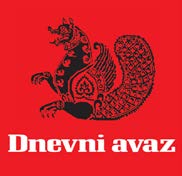

















‘An exciting documentary thriller about a scandal relating to the dis-
appearance of a photo roll in a laboratory in The Hague.’ 430
— Dnevni avaz, Bosnian daily
‘Marihuana is allowed there, but not a book on Srebrenica.’ 431
— Vesti, Serbian daily
‘Book recommendation! The book of the deployment of spies and
the photo roll of Dutchbat iii is now released again so everyone can
read what actually happened in the Netherlands.’ 432
— Veteran’s organisation Dutchbat iii
‘Sounds like a Hollywood production, but concerns a true story.’ 433
— Student, Slovenian youth portal
‘This thriller is a fine read and it truly happened. And when do you
read something about government espionage?’434
— Amsterdam FM
‘A must-read for everybody who wants to know more about gov-
ernment espionage in practice and the dangers entailed for all
involved.’ 435
— Dutch library institute Biblion (1st review)
‘In a compelling way, the author describes the rather transparent ac-
tivity of a secret agent he got confronted with at the internet service
provider where he worked at the time. ’ 436
— Dutch library institute Biblion (2nd review)
Recommendations
tions
213
214
The Cover-Up General
Abbreviations
aivd
General Intelligence and Security Service (Dutch: Algemene Inlich-
tingen- en Veiligheidsdienst). From 2002.
bvd
Domestic Security Service (Dutch: Binnenlandse Veiligheidsdienst).
From 1949 to 2002. Predecessor of aivd.
ctivd
Review Committee on the Intelligence and Security Servic-
es (Dutch: Commissie van Toezicht betreffende de Inlichtingen- en
Veiligheidsdiensten)
dgse
General Directorate for External Security (French: Direction Géné-
rale de la Sécurité Extérieure)
echr
European Convention of Human Rights
ecthr
European Court of Human Rights
igk
Inspector-General of the Armed Forces (Dutch: inspecteur-generaal
der krijgsmacht)
marid
Navy Intelligence Service (Dutch: Marine Inlichtingendienst). From
1949 to 1988.
mid
Military Intelligence Service (Dutch: Militaire Inlichtingendienst).
From 1988 to 2002. Predecessor of mivd.
mivd
Military Intelligence and Security Service (Dutch: Militaire Inlich-
tingen- en Veiligheidsdienst). From 2002.
MoD
Ministry of Defence
nhc
Netherlands Helsinki Committee
niod
niod Institute for War, Holocaust and Genocide Studies (Dutch:
niod Instituut voor Oorlogs-, Holocaust- en Genocidestudies)
nctv
National Coordinator for Security and Counter-Terrorism (Dutch:
Nationaal Coördinator Terrorismebestrijding en Veiligheid).
nos
Dutch Broadcasting Foundation (Dutch: Nederlandse Omroep
Stichting)
qra
Quick Reaction Alert
Abbreviations
215
Notes
The names in the notes are written as in the referenced documents. Excep-
tions include the following, whose names are fictitious: Jasper, Mark, Mon-
ica, Sander and Mr Hartogs. Moreover, to ensure their privacy, their real
names have been redacted in the various pieces that are published on the
book website thecoverupgeneral.com.
chapter 1
1. Invitation from Major of Marines J. Wichelo, Head of Recruitment Infor-
mation of the Defence Recruitment & Selection. Concerning an informa-
tion meeting about working as a naval officer, on 3 April 1998 at the Naval
Barracks Amsterdam. 18 March 1998.
2. Lieutenant Frans Adrianus Bernard Erkelens is listed as one of the Dutch
Officers working on the Burma-Siam Railway, 1 November 1944. Source:
National Archives in Washington, D.C., United States (record group 407,
box 121, volume 3, Thailand).
url: japansekrijgsgevangenkampen.nl/Birma-Siam%20officieren%20nov%20
1944.htm
3. Letter from H.M. Queen Wilhelmina to Mr F.A.B. Erkelens expressing
her sincere condolences on the death of both his parents. Royal Palace
Amsterdam, 11 December 1947.
url: x.com/edwingiltay/status/1466767708305956868
4. Statement of oath of allegiance, Recruitment Department of the Royal
Navy, signed in Scheveningen on 19 April 1998.
5. Confirmation of temporary deployment in the Telesales Department of
Casema, from consultant Sander of employment agency Randstad. Ri-
jswijk, 8 June 1998. Reference: 1594–case–gilt.
6. Invitation to psychological screening, sent by the Head of the Appoint-
ments Office of the Royal Navy, Navy Captain of Special Services First
Class R.J. Dekker-Prinsen. Amsterdam, 4 June 1998.
7. See: Thomassen, Jean. Oude meesters van morgen: de Daan Enneking Collec-
tie (‘Old masters of tomorrow: the Daan Enneking Collection’). Amster-
dam: Van Soeren, 2000.
8. Letter from Private Secretary M.C.C. Wijnen of H.R.H. Princess Irene to
the Honourable Mr F. Erkelens. The Hague, 19 September 1961.
216
The C
Not ov
es t er-
o PUp G
ages en
14 e–r al
17
9. ‘Kunstenaars over “voelkunst”: “Tast en kijk zonder gêne”’ (‘Artists on “feel art”: “Feel and look without shame”’). Daily Het Vrije Volk, 27 November
1982, page 15.
url: delpher.nl/nl/kranten/view?coll=ddd&identifier=ddd:010961239:mpeg21
:a0317
10. Appointment Order No. 020 of the President of the drumhead court-mar-
tial of the Royal Netherlands-Indonesian Army at Batavia (now Jakarta,
Indonesia), 26 October 1948.
url: dedoofpotgeneraal.nl/doc/krijgsraad.jpg
11. Thomassen. Oude meesters van morgen.
12. Rees, Willem Adriaan van. Toontje Poland: Voorafgegaan door eenige In-
dische typen (‘Toontje Poland: preceded by a few East Indian types’).
Arnhem: D.A. Thieme, 1867.
chapter 3
13. Letter to the Head of the Selection Department at the Naval Barracks
Amsterdam. Scheveningen, 21 June 1998.
chapter 5
14. Ian Knoop travelled to Egypt with Frans Erkelens Jr. in the role of Frans’
impresario. He confirmed his friendship with the Minister in an e-mail.
Subject: ‘re: Meta-realist Frans Erkelens’. 1 September 2009.
15. Jensen, M.W. and G. Platje. De marid: De Marine Inlichtingendienst van
binnenuit belicht (‘The marid: Naval Intelligence Service from the inside
out’). The Hague: Sdu Publishers, 1997, page 403.
16. Paintings of senior officers and photographs of Commodore Jan van
Dulm feature in the book Schilderijen van Frans Erkelens met betrekking
tot zijn beginperiode (‘Paintings of Frans Erkelens regarding his early pe-
riod’), composed by his sister Betty Giltay-Erkelens. It is donated to the
rkd-Netherlands Institute for Art History in The Hague.
chapter 6
17. Letter from E.M. Beezemer of Recruitment & Selection, Deputy Head of
the Office for Psychological Screening Royal Netherlands Navy. Amster-
dam, 13 July 1998.
18. Letter to domestic security service bvd. Leiden, 2 July 1994. Subject:
‘Dossier E.F. Giltay’.
19. Letter from the Acting Head of the Domestic Security Service A. Kie-
vits, on behalf of the Home Secretary. The Hague, 22 August 1995. Sub-
ject: ‘uw verzoek om inzage’ (‘your request for examining’). Reference: 2.214.163–4a.
Notes to Pages 17 – 51
217
chapter 7
20. Telephone conversation with Helena Zuidema of the Central Judicial
Documentation of the District Court of The Hague, 29 September 1998.
21. Personal interview with C.F.L. Zaat-Bolland, coordinator Application
Management of the Corps Directorate & Staff Section, at the Hague Po-
lice Headquarters, 14 October 1998 at 2.00 pm.
22. Appeal to the Personnel Directorate of the Royal Netherlands Navy.
Scheveningen, 21 October 1998. Sent by registered mail.
23. Letter from selection psychologist L.K.S. Kruithoed on behalf of the Di-
rector of Personnel, Royal Netherlands Navy. The Hague, 23 November
1998. Subject: ‘antwoord bezwaarschrift’ (‘reply to appeal’). Reference:
swo/182/we.se.402.
24. Answer by Deputy Minister of Education, Culture and Science A. Nuis to
questions by Member of Parliament G. Valk concerning the collection
of the Rijksmuseum voor Volkenkunde (National Museum of Ethnology)
in Leiden. Received on 15 July 1998. Parliamentary questions, number
1554, 1997–1998 session.
url: zoek.officielebekendmakingen.nl/ah-tk-19971998-1554.html
25. ‘Leids museum mist tienduizenden stukken’ (‘Leiden museum is missing tens of thousands of pieces’), daily de Volkskrant, 16 July 1998.
url: vk.nl/nieuws-achtergrond/
leids-museum-mist-tienduizenden-stukken~b2635453/
26. Petition to the National Ombudsman. Scheveningen, 1 December 1998.
Subject: ‘Verzoekschrift inzake sollicitatie bij het Ministerie van Defensie’
(‘Petition concerning job application at the Ministry of Defence’).
27. Letter from National Ombudsman M. Oosting to the Minister of Defence.
The Hague, 18 January 1999. Reference: 98.07789 003 and case handler
P.P.F. Schets.
28. Letter from Permanent Secretary D.J. Barth on behalf of the Minister of
Defence to the National Ombudsman. The Hague, 2 March 1999. Subject:
‘Uw brief 18 januari 1999’ (‘Your letter of 18 January 1999’). MoD’s ref-
erence: cno 99/001 9900134. Ombudsman’s reference: 98.07789 003. The
letterhead refers to the Directorate of Legal Affairs, Department of Ad-
ministrative, Criminal and Disciplinary Law.
Appendix 1 concerns a report by the mid Chief of Staff dated 12 Feb-
ruary 1999 titled ‘Notitie’ (‘Note’) regarding an ‘Intern onderzoek giltay’
(‘Internal investigation giltay’). Reference: det/51/99. The report was
written by mid Major R.F.J.H. de Ruijter and his Adjutant Rave. Cop-
ies were sent to the Head of the Counter-Intelligence and Security De-
partment (haciv) and the Head of the mid-Detachment (hmiddet). It
contains statements by former mid officer Monica and the Head of the
218
The C
Not ov
es t er-
o PUp G
ages en
54 e–r al
56
Intelligence Department Navy Captain W.H.C. van Straten.
url: dedoofpotgeneraal.nl/doc/chef-staf-mid.pdf
29. Ibid.
30. State portrait H.M. Queen Beatrix, by Frans Erkelens Jr., oil painting on
canvas, early 1990s. Depicted on page 122.
url: franserkelens.com
31. See letters from Beezemer (13 July 1998) and Kruithoed (23 November
1998).
32. First testimonial from Randstad Callflex. Rijswijk, 22 April 1999.
33. Second testimonial from Randstad Callflex. Rijswijk, 20 May 1999.
url: dedoofpotgeneraal.nl/doc/bijlage6.jpg
34. Testimonial by G.M. Doedée, vice president Human Resources of
Casema. Delft, 8 June 1999.
url: dedoofpotgeneraal.nl/doc/bijlage4.jpg
35. Statement on Mrs [Monica], prepared and signed by Jasper of his own
free will in Oosterhout on 10 June 1999.
36. Letter to National Ombudsman M. Oosting. Scheveningen, 10 May 1999.
Subject: ‘Onderzoek 98.07789 inzake sollicitatie bij het Ministerie van Defensie’
(‘Inquiry 98.07789 concerning job application at the Ministry of Defence’).
url: dedoofpotgeneraal.nl/doc/bedrijfsspionage.pdf
37. Letter to National Ombudsman, M. Oosting, Scheveningen, 28 May 1999.
Subject: ‘Aanvullend verzoekschrift c.q. onderzoek 98.07789 inzake sollici-
tatie bij het Ministerie van Defensie’ (‘Supplementary petition i.e. inquiry
98.07789 concerning job application at the Ministry of Defence’). Sent by
registered mail.
38. Report ‘Militaire Inlichtingen en Veiligheid’ (‘Military Intelligence and Security’) by the project group of the same name headed by Rear Admiral
S.W. van Idsinga, March 1995.
39. Interview with case handler P.P.F. Schets at the office of the National
Ombudsman in The Hague on 12 January 1999.
40. Letter to National Ombudsman M. Oosting. Scheveningen, 30 May 1999.
Subject: ‘Toezending aanvullend verzoekschrift c.q. onderzoek 98.07789 in-
zake sollicitatie bij het Ministerie van Defensie/Verzoek om vervanging me-
dewerker de heer P.P.F. Schets’ (‘Submission of supplementary petition i.e.
enquiry 98.07789 concerning job application at the Ministry of Defence/
request for replacement of Mr P.P.F. Schets’). Sent by registered mail.
41. Letter from Deputy Ombudsman L. de Bruin. The Hague, 17 June 1999.
Reference: 98.07789 011. Handled by Mr H.J.I.M. de Rooij.
42. Letter to G. Spong. Scheveningen, 19 May 1999.
43. Letter from G. Spong. The Hague, 28 May 1999. Reference: giltay/ad-
vice sp/.
Notes to Pages 56 – 63
219
44. Complaint to the Public Prosecutor at the District Court of The Hague, S.J.A.M. van Gend. Scheveningen, 28 June 1999. Subject: ‘Klaagschrift inzake artikel 261 juncto 262 Wetboek van Strafrecht; klager de heer E.F. Giltay
versus gedaagde mevrouw [Monica]’ (‘Complaint concerning Article 261 in
conjunction with Article 262 of the Dutch Criminal Code; plaintiff Mr
E.F. Giltay versus defendant Mrs [Monica]’). Sent by registered mail.
45. National tv News nos Journaal opening topic: ‘Minister De Grave ont-slaat top militaire inlichtingendienst mid’ (‘Minister De Grave sacks heads
of military intelligence service mid’). Presented by Pia Dijkstra, with a
statement by Minister De Grave in the broadcast. 13 July 1999, 8:00 pm.
url: zoeken.beeldengeluid.nl/program/urn:vme:default:progr
am:2101608080064630031
46. ‘De Grave zet leiding mid aan de kant’ (‘De Grave dismisses mid leader-
ship’), daily de Volkskrant, 14 July 1999, front page. See also the letter from the Minister of Defence to the Speaker of the House of Representatives. The Hague, 13 July 1999. Subject: ‘Srebrenica; Brief minister met
gespreksverslagen over rechts-extremistisch gedrag van Dutchbat-militairen’
(‘Srebrenica; Letter of Minister with interview reports on right-wing
extremist behaviour of Dutchbat soldiers’). Parliamentary Paper 26122,
number 13.
url’s: vk.nl/nieuws-achtergrond/de-grave-zet-leiding-mid-aan-de-
kant~b64e0a18 and zoek.officielebekendmakingen.nl/kst-26122-13.html
47. ‘Reportage over falende inlichtingendiensten en verkeerde inschattingen bij de
bescherming van de Bosnische moslimenclave door Dutchbat’ (‘Report on in-
telligence failures and miscalculations in the protection of the Bosnian
Muslim enclave by Dutchbat’), radio programme Argos, 29 June 2001.
url: vpro.nl/argos/speel~POMS_VPRO_1066703~wat-wist-de-nederlandse-
militaire-inlichtingendienst-mid-in-de-dagen-en-weken-voor-de-val-van-
enclave-over-mogelijke-servische-aanvalsplannen~.html
48. Berts, Dick and Voskuil, Bert, ‘Bij defensie raakt alleen de doofpot niet zoek’
(‘Only the cover-up is not lost at the MoD’), opinion magazine Nieuwe
Revu, 17 November 1999, page 46. That the development of the negatives
had failed by accident, was stated under oath by intelligence officer De
Ruyter during his interrogation on 6 December 2002 in the House of Rep-
resentatives by the Parliamentary Committee of Inquiry into the Fall of
Srebrenica.
url: yumpu.com/nl/document/read/14613759/verhoren-parlement-politiek
49. The name of Intelligence Major De Ruyter — who plays a leading role
in this cover-up affair — is spelled differently in official documents. This
leads to confusion. Was it Major De Ruiter, Major De Ruyter or Major
De Ruijter who complained that Lieutenant Rutten’s negatives had failed
220
The C
Not ov
es t er-
o PUp G
ages en
63 e–r al
64
because developer, bleach and fixer had been mixed up? I have also come across different spellings of Monica’s surname and other intelligence officers. Is the Minister of Defence closely briefed by the Head of
the mid General Vanderwijer, General Vandeweyer, or should he rely on
General Van der Weijer?
50. Supplementary complaint to the Public Prosecutor S.J.A.M. van Gend.
Scheveningen, 21 July 1999. Subject: ‘Klaagschrift/klachtschrift inzake ar-
tikel 268 dan wel artikel 261, 262 en 272 van het Wetboek van Strafrecht; klager de heer E.F. Giltay versus verdachte mevrouw [Monica]’ (‘Complaint
concerning Article 268 or Articles 261, 262 and 272 of the Criminal Code;
plaintiff Mr E.F. Giltay against defendant Mrs [Monica]’). Sent by regis-
tered mail.
51. Letter from the Chief Public Prosecutor S.J.A.M. van Gend. The Hague,
26 August 1999. Reference: staff/ho 871 00088.
52. Letter to National Ombudsman M. Oosting. The Hague, 21 September
1999. Reference: ‘Onderzoek 98.07789 inzake sollicitatie bij het Ministerie
van Defensie’ (‘Inquiry 98.07789 concerning job application at the Min-
istry of Defence’). Subject: ‘Toezending klacht inzake het optreden dan
wel het niet-optreden van mr. S.J.A.M. van Gend in zijn hoedanigheid van
Hoofdofficier van Justitie in het Arrondissement Den Haag’ (‘Submission of
complaint concerning the conduct or failure to conduct of S.J.A.M. van
Gend in his capacity as Chief Public Prosecutor in the District of The
Hague’). The letter contains three appendices, including the supplemen-
tary letter of complaint to the Public Prosecutor dated 21 July 1999. The
acknowledgement of receipt was signed by Barbara Plugge.
53. Report 1999/507 of the National Ombudsman Roel Fernhout, 17 Decem-
ber 1999.
url: ombudsman.nl/publicaties/rapporten/1999507
54. Two letters of complaint to the Chief Commissioner, specifically the
Chief of Police of The Hague J. Wiarda. Scheveningen, 16 September
1999. The acknowledgement of receipt was signed by Mrs E.P. den Haan.
55. Note of anonymous telephone conversation on 2 April 2000 around 3.02
am. I also reported the incident in a letter to Mr Schaepman of the Duin-
straat police station in Scheveningen. Scheveningen, 23 April 2000. Sub-
ject: ‘Mijn brief d.d. 22 april 2000 ter instelling formele beroepsprocedure’
(‘My letter of 22 April 2000 initiating the formal complaint procedure’).
Police reference: ro99 15395 of 02–09–1999.
56. Police report by Edwin Giltay, recorded by Detective A.A.C. van der Klauw
of the Hague police, at the Duinstraat police station in Scheveningen.
Number pl1523/1999/16079, 12 June 2000 at 10.45 am.
57. Mr Van Nood of the Duinstraat police station in Scheveningen confirmed
Notes to Pages 64 – 66
221
in a telephone conversation on 21 July 2000 at about 4.15 pm that the report had been forwarded to the Public Prosecutor’s Office in The Hague.
58. Letter from the Inspector of Police of the Hague Region, A. Teiwes, As-
sistant Public Prosecutor on behalf of the Public Prosecutor. The Hague,
19 September 2000. Reference: pl1523/1999/16079.
59. Letter to H.M. Beatrix, Queen of the Netherlands. Scheveningen, 14 Oc-
tober 2000.
60. Testimonial by Henk Brouwer, Director International Operations of ibm
Netherlands. Amsterdam, 18 October 1994.
url: dedoofpotgeneraal.nl/doc/ibm.pdf
61. Testimonial by Charles Vivian of Deloitte & Touche, 6 April 2000.
62. Two letters to the Minister of Defence F.H.G. de Grave. Written in
Scheveningen on 21 August and 15 October 2000. The letters have MoD
references cno 99/001 9900134 and cno 99/001 2000003670. The acknowl-
edgements of receipt were signed by Hazenoot and Beek respectively.
63. Letter from the Permanent Secretary on behalf of the Minister of De-
fence, signed by Deputy Permanent Secretary H.H. Hulshof. The Hague,
30 October 2000. Subject: ‘Rehabilitatie-/ rectificatieverzoek’ (‘Request for
rehabilitation/correction’). Reference: cno 99/001 2000004399.
64. Letter from the Permanent Secretary on behalf of the Minister of De-
fence, signed by Deputy Permanent Secretary H.H. Hulshof. The Hague,
26 September 2000. Subject: ‘Rehabilitatie-/ rectificatieverzoek’ (‘Request for rehabilitation/correction’). Reference: cno 99/001 2000003670.
65. Letter from the Permanent Secretary, 30 October 2000.
66. Letter from N. van de Pol for the Director of the Queen’s Office. The
Hague, 31 October 2000. Reference: rek 00.003477.
url: dedoofpotgeneraal.nl/doc/koningin.jpg
67. Advice from Chairman Ph.M. Weyenborg-Pot of the Independent Po-
lice Complaints Committee of the Hague Region to Chief of Police (and
Mayor) Deetman on the complaint lodged by Mr E.F. Giltay, The Hague.
Signed by the Chairman and Secretary of the Committee. The Hague, 13
December 2000.
68. Letter from Chief of Police W.J. Deetman. The Hague, 14 December 2000.
Reference: 22–7–2000. Subject: ‘bezwaar tegen klachtafdoening’ (‘objec-
tion to settlement of complaint’).
url: dedoofpotgeneraal.nl/doc/deetman.pdf
69. Ibid.
70. Letter from the Director of Police L.M.C. Ongering, on behalf of the
Home Secretary. Subject: ‘uw klacht over politieoptreden’ (‘your complaint
about police conduct’). The Hague, 11 January 2001.
url: dedoofpotgeneraal.nl/doc/minbiza.pdf
222
The C
Not ov
es t er-
o PUp G
ages en
66 e–r al
68
chapter 9
71. Duque de Baena. (26 December 2022). In Wikipedia, Dutch version. Ac-
cessed 26 February 2023.
url: nl.wikipedia.org/wiki/Duque_de_Baena
72. Thomassen. Oude meesters van morgen.
73. Trahair, Richard C.S. Encyclopedia of Cold War Espionage, Spies, and Secret
Operations. New York: Enigma Books, 2009. Lemma ‘Honey trap opera-
tions’, page 127.
url: books.google.nl/books?id=tFJLIIGVk10C&hl=nl
74. ‘kgb sex espionage’, Russian daily Pravda, 8 July 2002.
url: english.pravda.ru/news/society/45946-n/
75. Report Geen onderscheid naar geslacht bij werving en selectie (‘No sex dis-
crimination in recruitment and selection’), judgement number 2000–38
of the Equal Treatment Commission, 30 June 2000.
url: oordelen.mensenrechten.nl/oordeel/2000-38
76. Giltay, Edwin. Paper Het Arabisch-Israëlisch nucleair conflict (The Arab-Israeli nuclear conflict’). Leiden: 1991.
77. Rapport Nieuw Evenwicht. Rapport Doorlichting mid, Fase 2: nader onder-
zoek en advies (‘New Balance Report. Report Vetting mid, Phase 2: further
research and advice’), prepared under the direction of F.H. Herman de
Groot of the Ministry of Defence, 4 November 1998.
78. Ibid., page 42.
79. See also: Eerenbeemt, Marc van den. ‘Marinier L. smokkelde coke alsof het
niets was’ (‘Marine L. smuggled coke as if it were nothing’), daily de Volk-
skrant, 9 October 1998.
url: vk.nl/nieuws-achtergrond/
marinier-l-smokkelde-coke-alsof-het-niets-was~be8c2fb1/
80. Docters van Leeuwen, Arthur. Een spoor van vernieuwing (‘A path of re-
newal’). Amsterdam: Prometheus, 2020, page 287.
url: books.google.nl/books?id=zZf7DwAAQBAJ&dq=
81. Personal conservation with Edwin Keizer, parliamentary assistant to mp
Valk, at the Binnenhof in The Hague, 25 August 1998.
82. Frans Erkelens Jr’s studio was located at the Noordeinde street near the
Royal Palace in the 1970s. To circumvent protocol, H.R.H. Princess Irene
occasionally visited him. Uncle Frans denies rumours that he had a sex-
ual relationship with her. He says they only kissed passionately.
83. Docters van Leeuwen. Een spoor van vernieuwing, page 309.
84. See also: ‘Verdonk klampt zich nu vast aan René Lancee’ (‘Verdonk now clings to René Lancee’), daily De Pers, 3 December 2008.
85. ’Spijkers verdient meer dan eerherstel’ (‘Spijkers deserves more than reha-
bilitation’), daily de Volkskrant, 8 January 2011.
Notes to Pages 81 – 100
223
url: vk.nl/nieuws-achtergrond/
spijkers-verdient-meer-dan-eerherstel~bf3bcb7e/
86. ‘Van Velzen wil opheldering over bedreiging klokkenluider door staatssecreta-
ris’ (‘Van Velzen wants clarification on threat to whistle-blower by Depu-
ty Minister’), Socialist Party website, filed under Nieuws (‘News), Defensie (‘Defence’) and Democratie (‘Democracy’). 18 October 2005.
url: sp.nl/nieuws/2005/10/van-velzen-wil-opheldering-over-bedreiging-
klokkenluider-door-staatssecretaris
87. Note to Lucas entitled: ‘Waar gaat het om?’ (‘What is this all about?’) As
key points I wrote down: ‘Principes: Primaat politiek over defensie; verdedi-
gen van de democratische rechtsstaat’ (‘Principles: Primacy of politics over
the MoD; defending the democratic rule of law’). Scheveningen, April
1999.
chapter 10
88. Huisjes, Bert. ‘Generaal buiten dienst: Wonderboy Van Baal werd doofpot-
generaal’ (‘Wonder boy Van Baal turned cover-up general’), daily Algemeen Dagblad, 18 April 2002, front page.
89. Report Srebrenica: een ‘veilig’ gebied: Reconstructie, achtergronden, gevolgen
en analyses van de val van een Safe Area (‘Srebrenica: a ‘safe’ area: Recon-
struction, background, consequences and analysis of the fall of a Safe
Area’). Published by the Netherlands Institute for War Documentation.
Amsterdam: Boom, 2002.
url: publications.niod.knaw.nl/publications/srebrenicarapportniod_nl.pdf
90. ‘Kabinet stort in’ (‘Cabinet collapses’), daily de Telegraaf, 16 April 2002.
url: web.archive.org/web/20220609064453/https://krant.telegraaf.nl/krant/
archief/20020416/teksten/bin.pronk.kabinet.kok.srebrenica.html
91. Cann, Giselle van, and Groot, Ed. ‘Nederland gidsland: Val Kok markeert
einde periode’ (‘Guide country the Netherlands: fall of Kok marks end of
period’), daily Het Financieele Dagblad, 17 April 2002.
92. Telephone notes of a conversation with press photographer Cor de Kock
on 22 April 2011, 1.47 pm.
93. Telephone notes of conversation with Mr Hartogs of Casema on 18 April
2002, 2.30 pm.
94. Algemeen Dagblad, 18 April 2002.
95. Letter from the Minister of Defence to the Speaker of the House of
Representatives on the retirement from his post of Lieutenant General
A.P.P.M. van Baal, The Hague, 17 April 2002. Parliamentary document
61301. Reference: 26122 and number 31.
url: zoek.officielebekendmakingen.nl/kst-26122-31.html
96. Algemeen Dagblad, 18 April 2002.
224
Th
Not e C
es t ove
o P r-
agUp G
es
e
100n –e ral
110
chapter 11
97. Letter from G. Spong. 29 October 1999. Subject: sp 07.3204.
98. Complaint pursuant to Article 12 of the Code of Criminal Procedure,
with nine appendices, addressed to the Court of Appeal in The Hague,
attention of the Registrar of Criminal Cases. Submitted by miss A.
Wladimiroff of Wladimiroff Waling Schreuders Lawyers on behalf of
E.F. Giltay. 7 March 2001.
99. Letter from the Court of Appeal in The Hague, 14 October 2002. Sub-
ject: ‘Oproeping klager’ (‘Summons of plaintiff’). Case number: 01065k09,
with defendant Monica, who was not summoned.
100. Letter to A. Wladimiroff. Scheveningen, 18 March 2000. Subject: ‘Ver-
zoek om conceptklaagschrift conform artikel 12– procedure inzake onder-staand kenmerk/Toezending aanvullende schriftelijke informatie’ (‘Request
for draft notice of complaint in accordance with Article 12 procedure
on the following reference/Sending additional written information’).
Reference: ‘/drd 07.3204 giltay/advice letter dated 15 march 2000’.
101. Letter from A. Wladimiroff, 21 March 2000. Subject: ‘aw/at 07.3204
giltay/advice’.
102. ‘Wladimiroff staat Milosevic bij’ (‘Wladimiroff assists Milosevic’), daily Trouw, 7 September 2001.
url: trouw.nl/nieuws/wladimiroff-staat-milosevic-bij~ba1ebf98/
103. The correspondence by e-mail with the hotel concierge in Paris con-
sists of 15 messages in English sent between 2 and 31 October 2000. I
also received two letters from the concierge by post containing person-
al photographs, flyers, etc.
104. Tomlinson, Richard. The Big Breach: From Top Secret to Maximum Securi-
ty. Moscow: Mainstream Publishing, 2001.
105. ‘Greenpeace herdenkt Nederlandse activist’ (‘Greenpeace commemorates
Dutch activist’), daily Trouw, 10 July 2010.
url: trouw.nl/nieuws/greenpeace-herdenkt-nederlandse-activist~bac08077/
106. Ruling of Court of Appeal, The Hague, 19 December 2002. Serial num-
ber: 01065k09. Decision of Vice-President also chairman De Vries and
judges Van Dijk and Coster van Voorhout.
url: dedoofpotgeneraal.nl/doc/artikeltwaalf.pdf
107. Letter from secretary Marjanne Eilers of the fnv Ledenservice, Rotter-
dam, 28 May 2001. Reference: 21503706/giltay/me.
108. Letter to Ben Beelaard. Scheveningen, 28 June 2001. Reference:
3005.13/b, with explanation of the dossier of sixteen documents. Sent
by registered mail.
109. Letter from H.M. Schuh of the fnv Ledenservice, Rotterdam, 21 Novem-
ber 2001. Reference: 21508420/giltay/hs. A copy was sent to Beelaard.
Notes to Pages 111 – 115
225
110. Letter from A.T. Röst of the fnv Ledenservice, Rotterdam, 28 November 2001. Reference: 21503706/giltay/pg.
111. Klopper, Roy. ‘Defensie vervangt top wervingsbureau’ (‘MoD replaces
heads of recruitment agency’), daily De Telegraaf, 27 April 2001.
112. ‘Top Werving Defensie de laan uit’ (‘MoD’s recruitment chiefs sacked’),
nrc Handelsblad, 27 April 2001.
url: nrc.nl/nieuws/2001/04/27/top-werving-defensie-de-laan-uit-7539730
113. Ministry of Defence website. Section: ‘Militaire Inlichtingen- en Veilig-
heidsdienst, Wapenschild’ (‘Military Intelligence and Security Service,
Coat of Arms’). Version dated 22 May 2013. See also: ‘mivd borstzakem-
bleem’ (‘mivd breast pocket emblem’), Ingelicht: Informatiemagazine voor
de Militaire Inlichtingen- en Veiligheidsdienst (‘Information magazine for
the Military Intelligence and Security Service’), October 2005, issue 6,
page 2.
url’s: view the source of web.archive.org/web/20130522135759/http://www.
defensie.nl/mivd/organisatie_mivd/wapenschild/
and see also stichtingargus.nl/bvd/m/in/ingelicht-2005-6.pdf
114. ‘Van Baal wordt ombudsman krijgsmacht’ (‘Van Baal appointed Ombuds-
man of the Armed Forces’), Nederlands Dagblad, 5 September 2003.
url: nd.nl/nieuws/politiek/679832/van-baal-wordt-ombudsman-krijgsmacht
115. Letter to Inspector General of the Armed Forces, Lieutenant General
A.P.P.M. van Baal. Subject: ‘Rehabilitatie en schadevergoeding’ (‘Rehabil-
itation and compensation’). Scheveningen, 1 November 2004. Sent by
registered mail.
url: dedoofpotgeneraal.nl/doc/vanbaal1.jpg
116. Letter from Chief of Staff of the igk Navy Captain of Administration
H.T. Wagenaar, on behalf of the igk. Hilversum, 12 November 2004.
Subject: ‘Bemiddeling’ (‘Mediation’). Reference: 040275/001.
url: dedoofpotgeneraal.nl/doc/vanbaal2.jpg
117. See also: Letter from the Minister of Defence to the House of Repre-
sentatives on the role of the igk. The Hague, 20 May 2009. Parliamenta-
ry Paper 131234. Reference: ‘31700 x, number 115’.
url: parlementairemonitor.nl/9353000/1/j9vvij5epmj1ey0/vi5n7tw23evo
118. Letter to Inspector General of the Armed Forces Lieutenant General
A.P.P.M. van Baal. Subject: ‘Rehabilitatie en schadevergoeding’ (‘Rehabil-
itation and compensation’). Scheveningen, 2 December 2004. Sent by
registered mail.
url: dedoofpotgeneraal.nl/doc/vanbaal3.pdf
119. Jensen and Platje. De marid, pages 325–331.
120. Letter from the Inspector-General of the Armed Forces, Lieutenant
General of Artillery A.P.P.M. van Baal. Hilversum, 9 December 2004.
226
Th
Not e C
es t ove
o P r-
agUp G
es
e
115n –e ral
119
Subject: ‘Bemiddeling’ (‘Mediation’). Reference: 040275/003.
url: dedoofpotgeneraal.nl/doc/vanbaal4.pdf
121. Speech by General Van Baal at his swearing-in as Commander-in-
Chief of the Army. Malieveld, The Hague, 6 April 2001.
122. Interview with the new Chairman of the Board of Directors, Ad van
Baal: ‘Een leven lang dienen’ (‘A lifetime of service’), Politieacademiekrant (information magazine of the Police Academy), Apeldoorn, issue 12,
September/October 2007, pages 12–13.
123. Statement entitled ‘De eed of belofte’ (‘The oath or promise’). Royal Navy Recruitment Section, Defence Recruitment and Selection, December
1997.
124. Derix, Steven. ‘De eer van een Franse generaal’ (‘The honour of a French
general’), nrc Handelsblad, 30 November 2001.
url: nrc.nl/nieuws/2001/11/30/de-eer-van-een-franse-generaal-7567300
125. Srebrenica — rapport sur un massacre (‘Srebrenica — report on a massacre’), French parliamentary enquiry into the events in Srebrenica,
chaired by deputy François Loncle and with rapporteurs René André
and François Lamy. Paris, 22 November 2001, chapter 2, section B, page
99.
url: assemblee-nationale.fr/rap-info/i3413-01.asp
126. Ibid., page 100.
127. Letter to Minister of Defence Van Middelkoop. The Hague, 1 September
2007. Subject: ‘Eerherstel’ (‘Rehabilitation’). Sent by registered mail.
128. Letter from Permanent Secretary A.H.C. Annink, on behalf of Minister
of Defence Van Middelkoop. The Hague, 7 January 2008. Subject: ‘Eerh-
erstel’ (‘Rehabilitation’). Reference: c/2007034888.
129. Letter to B. Böhler of Böhler Franken Koppe Wijngaarden Lawyers. The
Hague, 7 March 2010.
130. My report on the storeroom fire for the Hague police. The Hague, 4 Jan-
uary 2011.
131. Official report of Edwin Giltay recorded by special investigating officer
Helena van Duin of the Hague Police Force, number pl1512 2011002721–
1, 4 January 2011. Case report for arson, at the Jan Hendrikstraat police
station in The Hague.
132. Nijeboer, Alexander. Een man tegen de staat: de tragische strijd van defen-
sieklokkenluider Fred Spijkers (‘A man against the state: the tragic struggle
of Defence whistle-blower Fred Spijkers’). Breda: Papieren Tijger, 2006.
133. Molhuysen, Maaike and Stiller, Louis. Handboek voor schrijvers (‘Hand-
book for writers’). Amsterdam: Augustus, 2009, chapter 21 ‘Hierbij daag
ik u!’ (‘I hereby summon you!’).
url: books.google.nl/books?id=6L1sAwAAQBAJ
Notes to Pages 119 – 127
227
134. Among other things, in an e-mail to Coen Borgman of SpeakEasy dated 21 April 2014. Subject: ‘Voortgang publicatie’ (‘Progress of
publication’).
135. Letter from Permanent Secretary Barth, 2 March 1999.
136. Fax from Monica to case handler Schets of the Office of the National
Ombudsman, The Hague. Ombudsman number: 9807787017. It is note-
worthy that in this fax, Monica misspelled her own surname with the
letters ‘ij’ instead of the letter ‘i’. In addition, the fax is dated 16 October
1999, whereas the date stamp indicates that it was received on 16 Sep-
tember 1999.
url: dedoofpotgeneraal.nl/doc/fax.pdf
137. Letter to Senator F.H.G. de Grave. The Hague, 24 September 2012.
138. E-mail from F.H.G. de Grave. 3 October 2012. Subject: ‘uw brief’ (‘your
letter’).
139. After the publication of this book, I heard the former Commander of
the Armed Forces off-duty General van Uhm prescribe this precaution
at a public meeting of the Royal Netherlands Army. The event was the
‘Mi-Literary Afternoon’ at the Utrecht Public Library, organised as part
of the Army Day on 13 May 2015.
140. Conversation with editor-copywriter Robert Preece. Rotterdam, 26 Oc-
tober 2013.
141. Plame, Valerie. Fair Game: My Life as a Spy, My Betrayal by the White House. Simon & Schuster: New York, United States, 2007.
url: books.google.nl/books?id=nVmteZqk5mYC
142. Letter to the Minister of Defence with the Dutch manuscript of The Cov-
er-up General attached. The Hague, 10 March 2014. Delivered in person
with proof of delivery.
url: dedoofpotgeneraal.nl/doc/aanbieding.jpg
143. Letter to the Home Secretary with the Dutch manuscript of The Cov-
er-up General attached. The Hague, 18 March 2014. Delivered in person
with proof of delivery.
144. E-mail from Jan Pronk, 31 July 2014. Subject: ‘ Re: Voorwoord voor het boek
De doofpotgeneraal’ (‘Re: Foreword for the book The Cover-up General’).
145. E-mail confirmation of return flight Eindhoven–Tuzla from Wizz Air,
24 August 2014. Subject: ‘Your itinerary: pejj3r’. Outbound flight on 14
September and return flight on 16 September 2014.
chapter 13
146. WhatsApp conversation with Coen Borgman, 25 November 2014.
147. Announcement of book launch The Cover-up General, daily nrc Handelsblad, 22 November 2014, page 26.
228
Th
Not e C
es t ove
o P r-
agUp G
es
e
128n –e ral
136
url: web.archive.org/web/20141127123126/http://vanbaarsel.net:80/temp/
NRC22-11-2014pag24-27.pdf
148. Schoonhoven, Silvan. ‘Uitzendkracht klem tussen de spionnen’ (‘Temp
caught between spies’), review in the daily Leidsch Dagblad, 27 Novem-
ber 2014, pages 2–3. Also appeared in the dailies: Gooi and Eemlander,
Haarlems Dagblad, IJmuider Courant and Noordhollands Dagblad.
149. Letter to Minister of Defence Jeanine Hennis. The Hague, 15 Febru-
ary 2015. Also sent by e-mail with the subject ‘mivd-klacht’ (‘mivd
complaint’).
150. E-mail to Home Secretary Ronald Plasterk. Subject: ‘Re: Zondagbrief:
Wet Normering Topinkomens’ (‘Re: Sunday letter: Top Income Standardi-
sation Act’), 29 December 2014. A copy was e-mailed to the ctivd.
151. Letter from Permanent Secretary Richard van Zwol, on behalf of the
Home Secretary. Subject: ‘Uw klacht’ (‘Your complaint’). Reference:
84f6d4a9-or1-2.0. 5 February 2015.
152. Letter from Permanent Secretary Richard van Zwol, on behalf of the
Home Secretary. Subject: ‘Uw klacht’ (‘Your complaint’). Reference:
8542b7b7-or1-1.0. 2 March 2015.
153. The visit to the ctivd in The Hague took place in the context of another
investigation: At the end of 2014, it was reported that Britta Böhler’s law
firm had been bugged by the aivd for years. Because I had approached
her on 7 March 2010 with my witness report, I filed a complaint against
the aivd with Home Secretary Plasterk on 29 December 2014 owing to
the possible breach of confidentiality. I also asked him how the aivd
had reacted to my contact with Böhler. Following an investigation by
the ctivd, the complaint was declared unfounded by Permanent Secre-
tary Van Zwol on 17 April 2015. The question of the aivd’s response was
left completely unanswered.
154. Letter from Permanent Secretary Richard van Zwol, signed on behalf of
the Home Secretary. Subject: ‘Uw klacht over de aivd’ (‘Your complaint
about the aivd’). Reference: 85978181-or1-2.0. 17 April 2015.
155. Letter from J.A. Hennis, Minister of Defence. Subject: ‘Uw klacht over
(vermeend) handelen van de mivd’ (‘Your complaint about (alleged) con-
duct of the mivd’). Reference: dis2015005421. 21 April 2015.
url: dedoofpotgeneraal.nl/doc/bijlage17.jpg
156. Letter from H.N. Brouwer, President of the ctivd, to R.H.A. Plasterk,
Home Secretary, The Hague, 27 March 2015. Subject: ‘Reactie ctivd op
doorzending tweede klacht van de heer Giltay over de aivd’ (‘Response of the
ctivd to the referral of Mr Giltay’s second complaint against the aivd’).
ctivd reference: 2015/0069. Ministry reference: 8524b7b7-or1-1.0.
157. Memo from the Director General of the aivd General Rob Bertholee to
Notes to Pages 136 – 137
229
the Permanent Secretary of the Ministry of the Interior and Kingdom
Relations Van Zwol. 10 April 2015. Reference: 8597817f-or1-1.0. Sub-
ject: ‘Reactie op klacht van dhr. Giltay; Advies: graag brieven ondertekenen’
(‘Response to complaint by Mr Giltay; Advice: please sign letters’).
158. Holthuis, Jurriën. ‘Boek: Duistere Uitzendkracht’ (‘Book: Shady Temp’), review in opinion magazine Nieuwe Revu, 4 February 2015, page 56.
url: dedoofpotgeneraal.nl/doc/revu.jpg
159. Lardenoye, Fred. ‘De doofpotgeneraal’ (‘The Cover-up General’), review
Checkpoint magazine, April 2015, page 29.
url: content.yudu.com/web/1r3p1/0A1zrki/CP1503/html/index.html?page=29
160. Kumru, Can. ‘De doofpotgeneraal’ (‘The Cover-up General’), review
Dutch Library Service Biblion, April 2015.
url: web.archive.org/web/20210909213414/https://www.nbdbiblion.nl/sites/











































































































































